تتكشف محرقة في غزة أمام أعيننا—تجويع، تشويه، وقتل بمقياس يتحدى الفهم. لقد قُتل أكثر من 50,000 فلسطيني، معظمهم من المدنيين، منذ أكتوبر 2023. لم تدخل أي مساعدات منذ أوائل مارس 2025، مما يعرض 60,000 طفل لخطر الموت جوعاً و390,000 شخص للتهجير، غالبًا عدة مرات، دون مأوى آمن. هذه ليست مجرد أزمة؛ إنها خنق متعمد لـ 2.3 مليون روح. بالنسبة لأولئك في غزة، كل يوم هو صراع ضد الموت. أما بالنسبة لأصدقائهم وأقاربهم في الخارج—الفلسطينيون في الشتات، الحلفاء المرتبطون بالأرض، والمجتمعات المرتبطة بالحب أو التاريخ—فالألم نوع مختلف من العذاب: مشاهدة الأحباء وهم يذبلون، عاجزين عن إيقاف ذلك. لا يمكننا أن نقف مكتوفي الأيدي بينما يستهلك هذا الألم كلاً من المحاصرين وأولئك الذين يحملون حزنهم عبر المحيطات. الوقت للعمل الآن—ليس غدًا، ليس عندما "تُفتح" الحدود، بل اليوم—لكسر الحصار، إيصال المساعدات، والنضال من أجل العدالة.
في غزة، المعاناة فورية وقاسية. العائلات تجوع—90% مشردون، ينقبون في الأنقاض بحثًا عن فتات. الغارات الجوية تمحو سلالات بأكملها؛ المستشفيات أصبحت أطلالاً محطمة. تحمل هذا يعني معرفة لسعة الجوع، قبضة الخوف، وظل الموت. أم تراقب ضلوع طفلها بارزة، عاجزة عن إطعامه. أخ يدفن أخته، قُتلت في غارة. هذا ألم منحوت في اللحم والعظم.
لكن بالنسبة لأولئك في الخارج المرتبطين بفلسطين—الأصدقاء، العائلة، مجتمعات الشتات—ألم المشاهدة هو جحيم خاص به. تخيل أن تستيقظ في لندن، عمان، أو شيكاغو على أخبار ابن عم آخر قُصف، صديق آخر جاع. ترى وجوههم في كل تقرير: أحمد منصور، صحفي احترق حياً أمام الكاميرا؛ طفل جارك سُحق تحت الأنقاض. وسائل التواصل الاجتماعي تنقل صراخهم، لكنك على بعد آلاف الأميال، عاجز عن العناق، الإطعام، أو الإنقاذ. الفلسطينيون في الخارج يحملون هذا الثقل يوميًا—مظاهرات في مدن توأم رام الله أو شوارع نيويورك تعكس حزنهم، لكن الحدود والسياسة تكبل أيديهم. الحلفاء أيضًا، ذوو الجذور في نضال فلسطين، يشعرون به: ذنب الأمان، غضب التقاعس. تُظهر دراسات عن صدمات الشتات—فكر بالروانديين أو السوريين—أن هذا "الألم الثانوي" يولد اضطراب ما بعد الصدمة، الاكتئاب، وذنب الناجي بعمق مثل الجروح الجسدية.
أيهما أسوأ؟ انهيار الجسد أم القلب؟ في غزة، المعاناة رعب محدود، ينتهي بالموت أو البقاء. المشاهدة من بعيد—سواء كنت فلسطينيًا في المنفى أو صديقًا مرتبطًا بالحب—هي جرح يتفاقم إلى أجل غير مسمى. تطاردك "ماذا لو": هل كان بإمكاني إرسال المال؟ الانضمام إلى مسيرة؟ تغيير حياة واحدة؟ كلاهما لا يطاق، لكن ألم الشتات هو جسر بين العوالم—صراخ غزة يتردد في أرواحهم، وأصواتهم يمكن أن تضخم النضال. هذه المعضلة تطالبنا بالعمل، ليس فقط من أجل الجائعين ولكن من أجل المشاهدين، الممزقين بحبهم وخسارتهم.
حصار غزة هو حصن من القسوة—البر، البحر، والجو مغلقون بقبضة إسرائيل الحديدية. الطعام، الدواء، والوقود تتراكم في رفح وكرم أبو سالم، تتعفن بينما تتوسل الأونروا للدخول. في عام 2024، حاولت الولايات المتحدة، الأردن، وآخرون الإسقاط الجوي—38,000 وجبة جاهزة أُسقطت، ومضة أمل—لكنها كانت غير كافية بشكل مؤلم. لقي خمسة أشخاص حتفهم عندما فشلت المظلات؛ غرقت المساعدات في البحر أو نُهبت. بحلول مارس 2025، توقفت حتى هذه الجهود. لماذا؟ الإسقاطات الجوية مكلفة (10,000 دولار لكل رحلة)، غير فعالة (الشاحنات تحمل 100 طن؛ الطائرات، جزء صغير)، وخطيرة بدون فرق أرضية لتأمين الإسقاط. سيطرة إسرائيل على المجال الجوي تسقط الطائرات بدون طيار المارقة، ولا منظمة غير حكومية تجرؤ على تحديها بمفردها.
والأسوأ، لا توجد منظمة لكسر هذا الحصار بإسقاطات جوية مستدامة. عمالقة الإغاثة مثل أوكسفام أو المساعدات الطبية للفلسطينيين يركزون على المناصرة أو المساعدات الأرضية، واصفين الإسقاطات الجوية بـ"الرمزية". هم على حق—الطرق البرية أفضل—لكن عندما تكون المعابر مغلقة، لماذا لا يبتكر أحد؟ تستخدم أمازون طائرات بدون طيار لتوصيل الطرود في المناطق النائية، تسقط البضائع إلى إحداثيات دقيقة دون أن يخاطر الطيارون بأجواء متنازع عليها. يمكن أن تكون غزة التالية. الطائرات بدون طيار—صغيرة، خفية، موجهة بنظام تحديد المواقع—يمكن أن تحمل الطعام، الدواء، أو أجهزة تنقية المياه للعائلات، متجاوزة حماس والنهابين. طائرة بدون طيار بـ5,000 دولار يمكن أن تحمل 10 كيلوغرامات؛ أسطول من 1,000 يمكن أن يطعم الآلاف يوميًا. التكنولوجيا موجودة، مثبتة في مناطق حرب أوكرانيا وتوصيلات ريفية أمريكية. لكن لم يتبناها أحد.
لماذا لا؟ السياسة تُشل. تخشى المنظمات غير الحكومية غضب إسرائيل أو عقوبات الولايات المتحدة. الجيوش تحتاج موافقة الدولة، التي لن تمنحها الولايات المتحدة. عملية "سماء لغزة" المارقة قد تعرض للتصعيد—لكن عدم القيام بشيء يصعد الموت. الفلسطينيون في الخارج، ينظمون في مدن مثل ديربورن أو سانتياغو، يمكن أن يقودوا هذه المهمة، بجمع تبرعات جماعية وخبرات تكنولوجية. حصتهم الشخصية—عائلات محاصرة في غزة—تجعلهم لا يُوقفون. نحتاج إلى رؤيتهم لخلق حركة جديدة، تقدم الخبز حيث تسقط القنابل.
الأمم المتحدة، الحارس المفترض للإنسانية، هي متفرج على مذبحة غزة. مجلس الأمن الدولي، مشلول بفيتوات الولايات المتحدة، فشل مرارًا—ديسمبر 2023، فبراير 2024، نوفمبر 2024—في منع وقف إطلاق النار ومقررات المساعدات لـ"حماية" حملة إسرائيل. كل فيتو يدفن غزة أعمق. الجمعية العامة للأمم المتحدة، الخالية من الفيتو، تملك ورقة قوية: القرار 377، "الاتحاد من أجل السلام". وُلد عام 1950 لتجاوز انسداد الحرب الباردة، يتيح للجمعية العامة التوصية بإجراءات—وقف إطلاق النار، ممرات مساعدات، حتى قوات حفظ سلام—عندما يفشل مجلس الأمن. نجح في عام 1956، مخلقًا قوات الأمم المتحدة لأزمة السويس.
لكن الجمعية العامة أهدرت هذه القوة. في أكتوبر 2023، أقرت قرار هدنة (120-14)؛ في ديسمبر، استدعت مصر القرار 377 لجلسة طارئة. لكن لم يتبع شيء—لا عقوبات، لا قوة إنسانية، لا مطالبة بفتح رفح. في عام 2024، تلاشت جلسة أخرى—أيد 153 دولة السلام، لكن إسرائيل تجاهلته، محمية بنفوذ الولايات المتحدة. لماذا؟ قرارات الجمعية العامة غير ملزمة، مجرد اقتراحات. الحلفاء مثل ألمانيا أو المملكة المتحدة ينصاعون لضغط الولايات المتحدة، خائفين من ضربات تجارية أو دبلوماسية. حتى الدول العربية تتردد، عالقة في شبكات جيوسياسية. القرار 377 يمكن أن يحشد تحالفًا لتحطيم الحصار، لكن الخوف من مواجهة القوة يسود. في هذه الأثناء، يموت أطفال غزة، والفلسطينيون في الخارج—مثل أولئك المتظاهرين في دبلن أو القاهرة—يشاهدون وطنهم يحترق، مخذولين بتقاعس عالمي.
لا يمكننا أن ندع فلسطينيًا آخر يجوع بينما يبكي أقرباؤهم في الخارج. لا يمكننا أن ندع الأصدقاء—سواء في فلسطين أو مرتبطين بها بدم وقلب—يحملون هذا الحزن بمفردهم. هذا نضالنا، من أجل المعانين وأولئك المشاهدين:
إطلاق "سماء لغزة": يجب أن يقود الفلسطينيون في الشتات، من عمان إلى تورنتو. جمع تبرعات بقيمة 10 ملايين دولار لأسطول طائرات بدون طيار—1,000 طائرة بـ5,000 دولار لكل منها، توصل الطعام والدواء يوميًا. التعاون مع شركات التكنولوجيا لتصميمات خفية، مثبتة في توصيلات أمازون. إسقاط المساعدات للعائلات، ليس لأمراء الحرب. إذا أسقطتها إسرائيل، فليشهد العالم.
فرض عمل الجمعية العامة: اغمر الدبلوماسيين بمطالب عقد جلسة القرار 377. ادفع لتحالف ملزم—عقوبات، قوات حفظ سلام، فتح معابر. الفلسطينيون في الخارج، مع حلفاء في كل مدينة، يمكن أن يملؤوا ساحات الأمم المتحدة، جاعلين الصمت مستحيلاً. إذا استخدمت الولايات المتحدة الفيتو ضد السلام، فلتتجاوزها 193 دولة.
التضخيم والتنظيم: شارك أصوات غزة—تغريدات من جباليا، قصص من أبناء عمومة في مدينة غزة. مقاطعة ممكني الحصار. التظاهر أمام السفارات، بقيادة مجتمعات الشتات التي يغذي ألمها التغيير. مسيراتهم في لندن أو بيروت هي مخططنا.
الابتكار معًا: مهندسون في الدوحة، مبرمجو شيكاغو—صمموا طائرات بدون طيار. محامون في رام الله—صيغوا تحديات قانونية. متبرعون في كل مكان—ادعموا مجموعات مثل أطباء بلا حدود، الذين يدفعون للوصول. كل عمل يُحسب، خاصة من أولئك الذين يحملون فلسطين في قلوبهم.
المعاناة في غزة أو مشاهدتها من بعيد—كلاهما لا يطاق. الفلسطينيون في الخارج يحملون ألم غزة في عظامهم، مكالماتهم الهاتفية دون إجابة، أحلامهم مسكونة. نحن نناضل من أجلهم بقدر ما نناضل من أجل المحاصرين. طائرة بدون طيار تسقط الطحين ليست مجرد طعام؛ إنها دليل على أننا لم نتخل عنهم. تصويت الأمم المتحدة ليس مجرد سياسة؛ إنه إشارة لكل فلسطيني في المنفى: أنتم لستم وحدكم. انضموا إلينا. موّلونا. ناضلوا معنا. اكسروا الحصار، من أجل الجائعين والمحزونين على حد سواء.
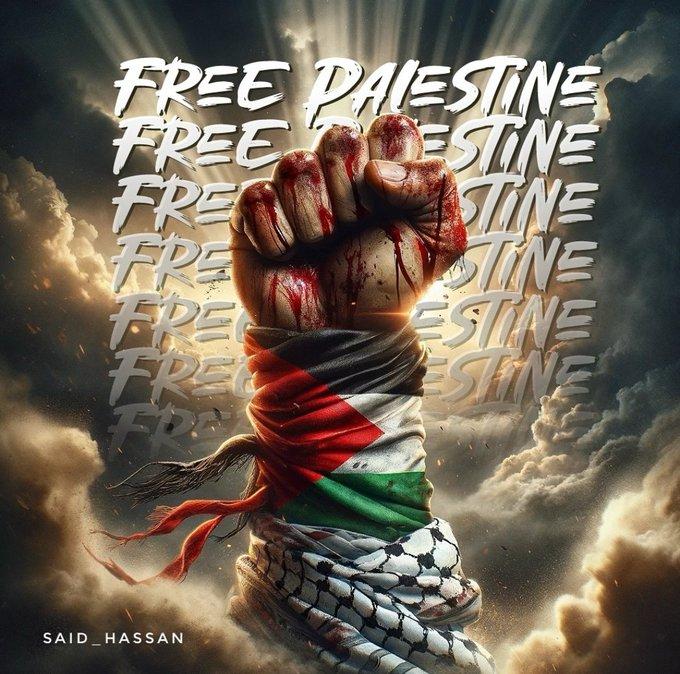
A holocaust unfolds in Gaza before our eyes—starvation, maiming, and murder on a scale that defies comprehension. Over 50,000 Palestinians, mostly civilians, have been killed since October 2023. No aid has entered since early March 2025, leaving 60,000 children at risk of dying from hunger and 390,000 people displaced, often multiple times, with nowhere safe to run. This is not just a crisis; it’s a deliberate strangulation of 2.3 million souls. For those in Gaza, every day is a fight against death. For their friends and kin abroad—Palestinians in diaspora, allies with ties to the land, and communities bound by love or history—the pain is a different kind of torment: watching loved ones waste away, helpless to stop it. We cannot stand by as this agony consumes both those under siege and those carrying their grief across oceans. The time to act is now—to break the blockade, deliver aid, and fight for justice.
In Gaza, suffering is immediate and merciless. Families starve—90% displaced, sifting through rubble for scraps. Airstrikes erase entire bloodlines; hospitals are bombed-out shells. To endure this is to know hunger’s bite, fear’s grip, and death’s shadow. A mother watches her child’s ribs protrude, powerless to feed them. A brother buries his sister, killed in a strike. This is agony carved into flesh and bone.
But for those abroad with ties to Palestine—friends, family, diaspora communities—the pain of witnessing is its own hell. Imagine waking in London, Amman, or Chicago to news of another cousin bombed, another friend starved. You see their faces in every report: Ahmad Mansour, a journalist burned alive on camera; a neighbor’s child crushed under rubble. Social media streams their screams, yet you’re thousands of miles away, unable to hug, feed, or save them. Palestinians abroad carry this weight daily—protests in Ramallah’s twin cities or New York’s streets echo their grief, but borders and politics block their hands. Allies, too, with roots in Palestine’s struggle, feel it: the guilt of safety, the rage of inaction. Studies on diaspora trauma—think Rwandans or Syrians—show this “secondary suffering” breeds PTSD, depression, and survivor’s guilt as deep as physical wounds.
Which is worse? The body’s collapse or the heart’s? In Gaza, suffering is a finite horror, ended by death or survival. Watching from afar—whether you’re a Palestinian in exile or a friend tied by love—is a wound that festers indefinitely. You’re haunted by “what ifs”: Could I have sent money? Joined a march? Changed one life? Both are unbearable, but the diaspora’s pain is a bridge between worlds—Gaza’s screams echo in their souls, and their voices can amplify the fight. This dilemma demands we act, not just for those starving but for those watching, torn apart by love and loss.
Gaza’s blockade is a fortress of cruelty—land, sea, and air sealed by Israel’s iron grip. Food, medicine, and fuel pile up at Rafah and Kerem Shalom, rotting while UNRWA begs for access. In 2024, the U.S., Jordan, and others tried airdrops—38,000 MREs dropped, a flicker of hope—but they were woefully inadequate. Five died when parachutes failed; aid sank into the sea or was looted. By March 2025, even these stopped. Why? Airdrops are costly ($10,000 per flight), inefficient (trucks carry 100 tons; planes, a fraction), and risky without ground teams to secure drops. Israel’s airspace control downs rogue drones, and no NGO dares defy it alone.
Worse, no organization exists to break this siege with sustained airdrops. Humanitarian giants like Oxfam or Medical Aid for Palestinians prioritize advocacy or ground aid, calling airdrops “symbolic.” They’re right—land routes are better—but when crossings are locked, why isn’t anyone innovating? Amazon uses drones to deliver packages in remote areas, dropping goods to exact coordinates without pilots braving contested skies. Gaza could be next. Drones—small, stealthy, GPS-guided—could carry food, medicine, or water purifiers to families, bypassing Hamas and looters. A $5,000 drone can lift 10 kilos; a fleet of 1,000 could feed thousands daily. The tech is here, proven in Ukraine’s war zones and rural U.S. deliveries. Yet no group has seized this.
Why not? Politics paralyze. NGOs fear Israel’s wrath or U.S. sanctions. Militaries need state approval, which the U.S. won’t give. A rogue “Sky for Gaza” operation risks escalation—but doing nothing escalates death. Palestinians abroad, organizing in cities like Dearborn or Santiago, could lead this charge, crowdfunding drones and tech expertise. Their personal stake—family trapped in Gaza—makes them unstoppable. We need their vision to birth a new movement, one that delivers bread where bombs fall.
The United Nations, humanity’s supposed guardian, is a bystander to Gaza’s slaughter. The UN Security Council, crippled by U.S. vetoes, has failed repeatedly—December 2023, February 2024, November 2024—blocking ceasefires and aid resolutions to “protect” Israel’s campaign. Each veto buries Gaza deeper. The UN General Assembly, free of vetoes, holds a trump card: Resolution 377, “Uniting for Peace.” Born in 1950 to bypass Cold War gridlock, it lets the UNGA recommend action—ceasefires, aid corridors, even peacekeepers—when the UNSC falters. It worked in 1956, creating UN forces for Suez.
Yet the UNGA has squandered this power. In October 2023, it passed a truce resolution (120-14); in December, Egypt invoked Resolution 377 for an emergency session. But nothing followed—no sanctions, no humanitarian force, no demand to open Rafah. In 2024, another session fizzled—153 nations backed peace, yet Israel ignored it, shielded by U.S. clout. Why? The UNGA’s resolutions are toothless, mere suggestions. Allies like Germany or the UK bow to U.S. pressure, fearing trade or diplomatic hits. Even Arab states hesitate, caught in geopolitical webs. Resolution 377 could rally a coalition to smash the blockade, but fear of confronting power prevails. Meanwhile, Gaza’s children die, and Palestinians abroad—like those rallying in Dublin or Cairo—watch their homeland burn, betrayed by global inaction.
We cannot let another Gazan starve while their kin abroad weep. We cannot let friends—whether in Palestine or tied to it by blood and heart—carry this grief alone. This is our fight, for those suffering and those watching:
Launch “Sky for Gaza”: Palestinians in diaspora, from Amman to Toronto, must lead. Crowdfund $10 million for a drone fleet—1,000 drones at $5,000 each, delivering food and medicine daily. Partner with tech firms for stealth designs, proven in Amazon’s deliveries. Drop aid to families, not warlords. If Israel shoots them down, let the world see.
Force UNGA Action: Flood diplomats with demands for a Resolution 377 session. Push for a binding coalition—sanctions, peacekeepers, open crossings. Palestinians abroad, with allies in every city, can pack UN plazas, making silence impossible. If the U.S. vetoes peace, let 193 nations override it.
Amplify and Organize: Share Gazan voices—tweets from Jabaliya, stories from cousins in Gaza City. Boycott blockade enablers. Protest at embassies, led by diaspora communities whose pain fuels change. Their rallies in London or Beirut are our blueprint.
Innovate Together: Engineers in Doha, coders in Chicago—design drones. Lawyers in Ramallah—draft legal challenges. Donors everywhere—fund groups like Doctors Without Borders, who push for access. Every act counts, especially from those with Palestine in their hearts.
Suffering in Gaza or watching it from afar—both are unbearable. Palestinians abroad carry Gaza’s pain in their bones, their phone calls unanswered, their dreams haunted. We fight for them as much as for those under siege. A drone dropping flour isn’t just food; it’s proof we haven’t abandoned them. A UN vote isn’t just policy; it’s a signal to every Palestinian in exile: you’re not alone. Break the siege, for the starved and the grieving alike.
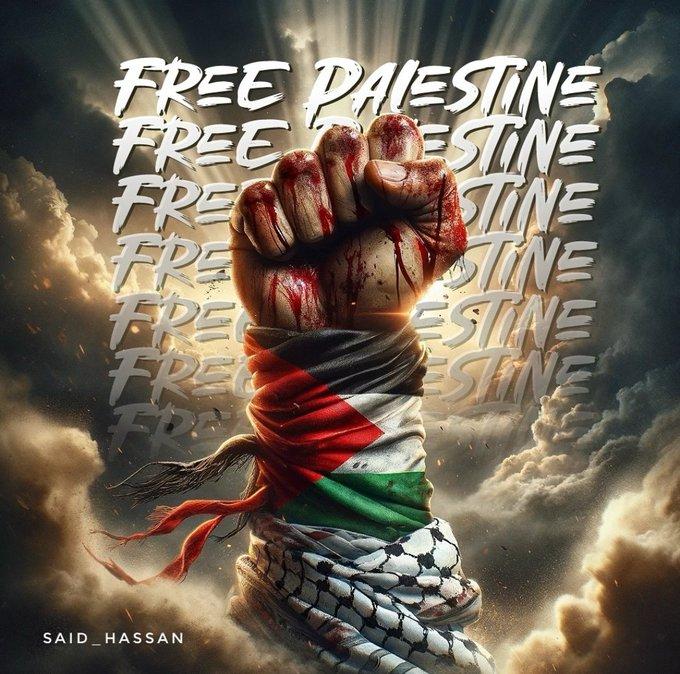
The people in Gaza cannot eat (electronic) money and Israel s blocking the entry of food. We must urge the United Nations to act now. Resolution 377 "Uniting for Peace" enables the General Assembly to sidestep the US Veto in the Security Council. https://x.com/R34lB0rg/status/1910957895488843908
We can send donations to Gaza but fact is that the people there cannot eat (electronic) money and Israel is blocking the entry of food. We need the UN to act. NOW! https://x.com/R34lB0rg/status/1910957895488843908
If the United Nations do not act now, they're as useless as their predecessor, the League of Nations and will have the blood of 2 million Palestinians on their hands.
I urge @antonioguterres to immediately convene ES10 and floor this Resolution https://x.com/UNRWA/status/1910935917788876822
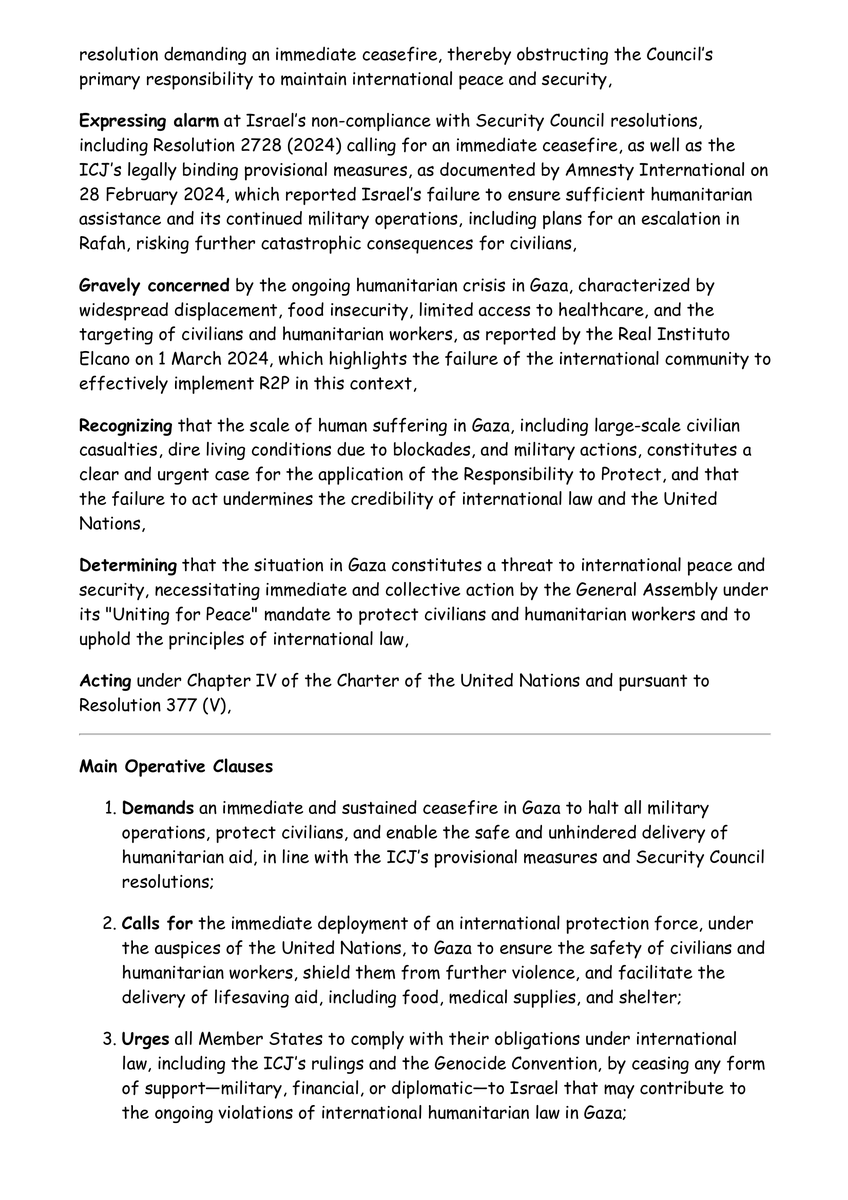
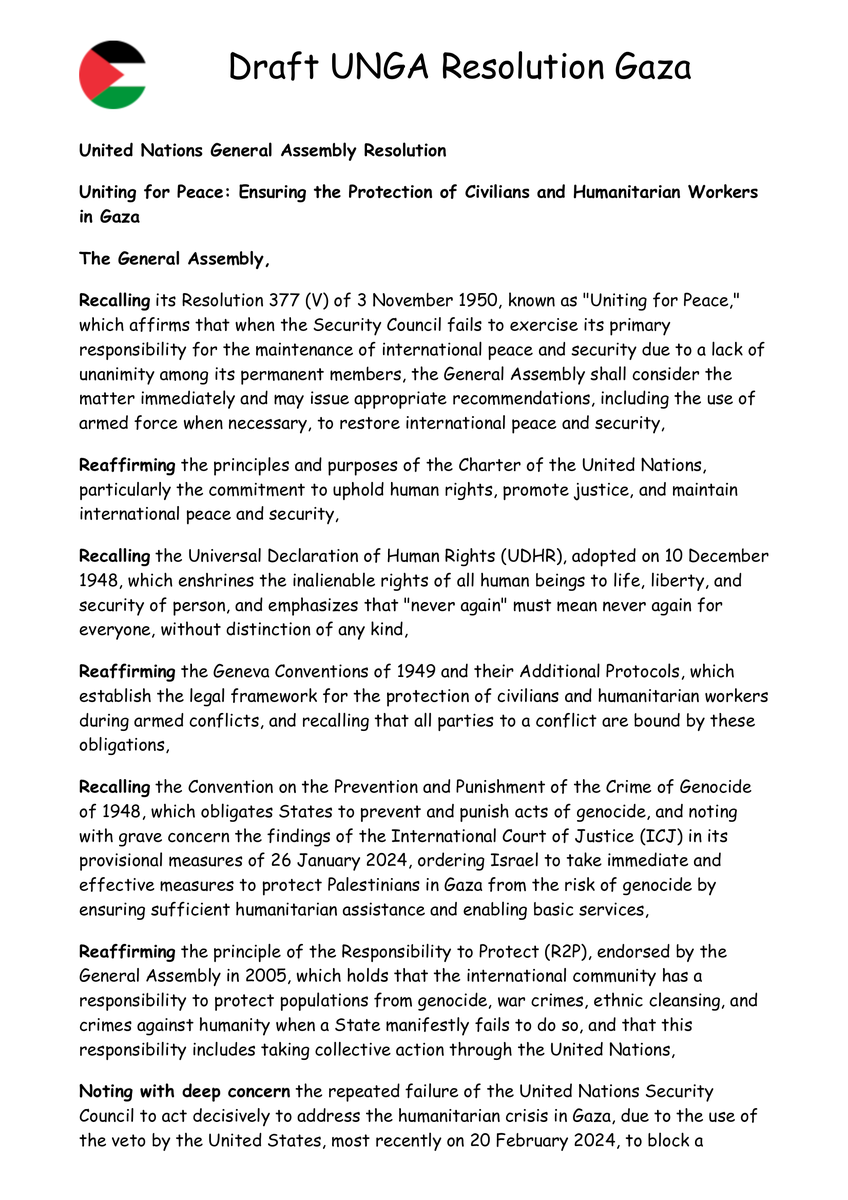
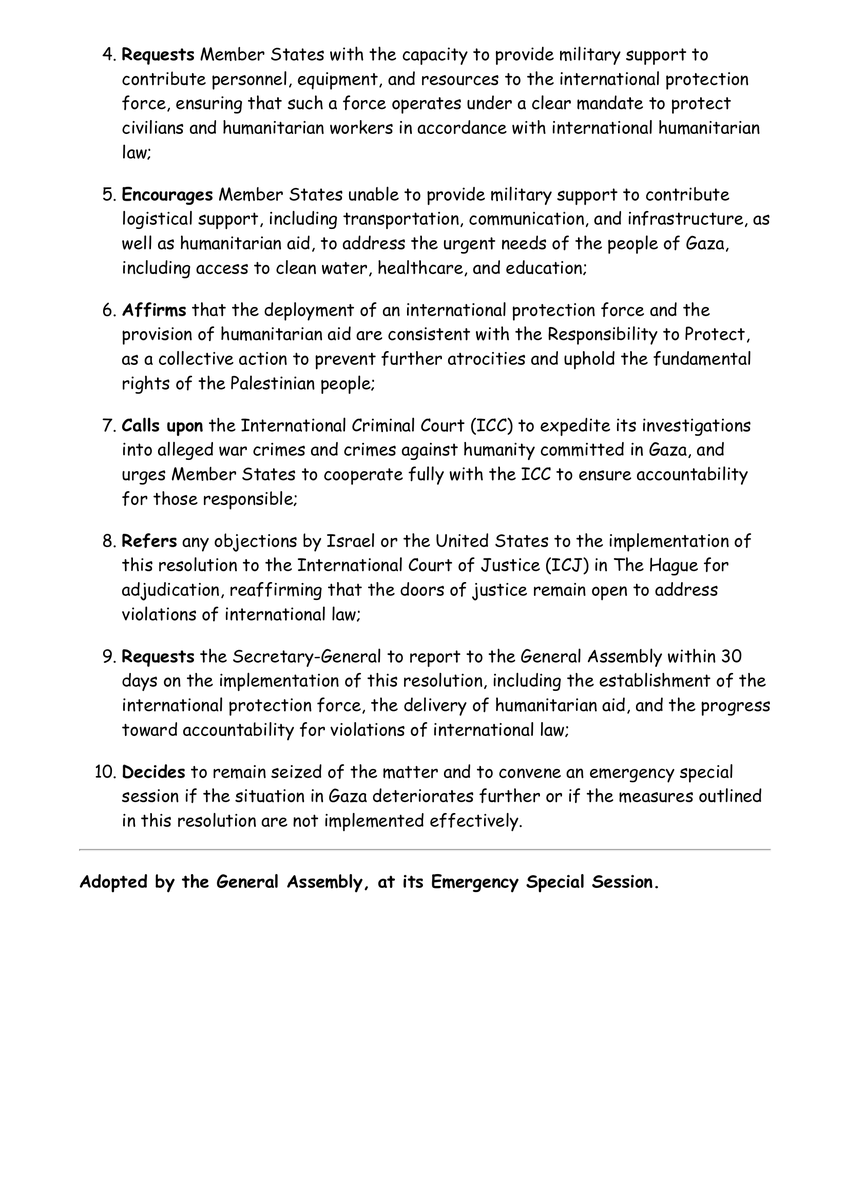
A Member of the United Nations which has persistently violated the Principles contained in the present Charter may be expelled from the Organization -- UN Charter, Article 6 https://x.com/CraigMokhiber/status/1910719584920883260
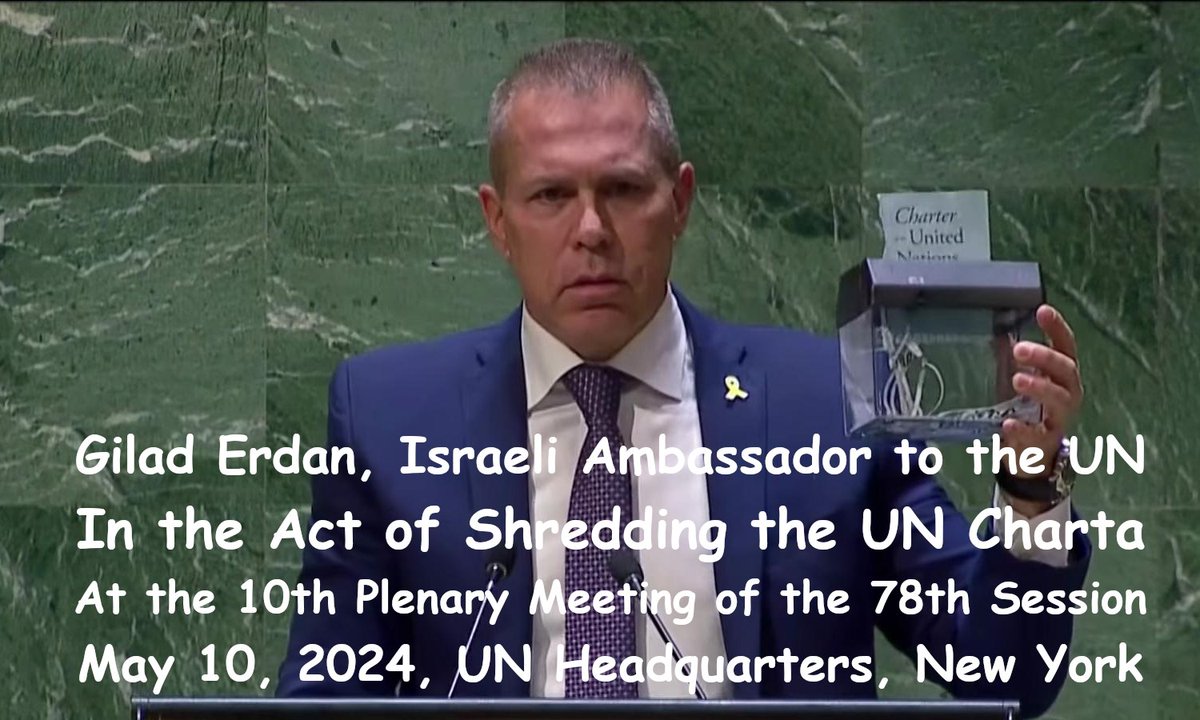
Righteous Among the Nations - חסיד אומות העולם
These states actively resist Israel’s actions through diplomatic, legal, or military means, supporting Palestinian rights.
These states recognize Palestine or criticize Israel but take limited action beyond rhetoric or votes.
These states are neutral, abstain in key votes, or have mixed policies, mirroring Évian’s inaction.
These states enable Israel through diplomatic support, trade, or abstaining from key votes, showing complicity.
These states directly enable Israel’s actions through military, diplomatic, or veto support.
There are no painkillers because of Israel's siege... https://x.com/Hamzasharif5750/status/1910673123856331122
Musk’s stance against “from the river to the sea” while allowing calls to “nuke Gaza” or “exterminate Palestinians” is a glaring example of his hypocrisy on free speech and content moderation. It demonstrates that X, under Musk’s leadership, is not a neutral platform but one that actively suppresses pro-Palestinian voices while enabling incitement against Palestinians, potentially contributing to the dehumanization and targeting of Palestinians in Gaza.
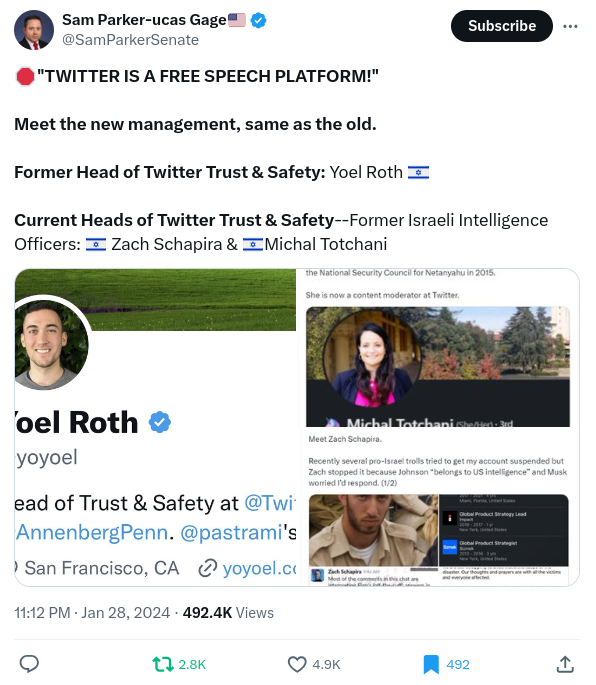
The presence of former Israeli intelligence officers in Trust and Safety roles could contribute to a systemic bias against pro-Palestinian content. For example, keywords related to Gaza, Deir Yassin, or criticism of Israel might be more likely to trigger shadowbans or suspensions.
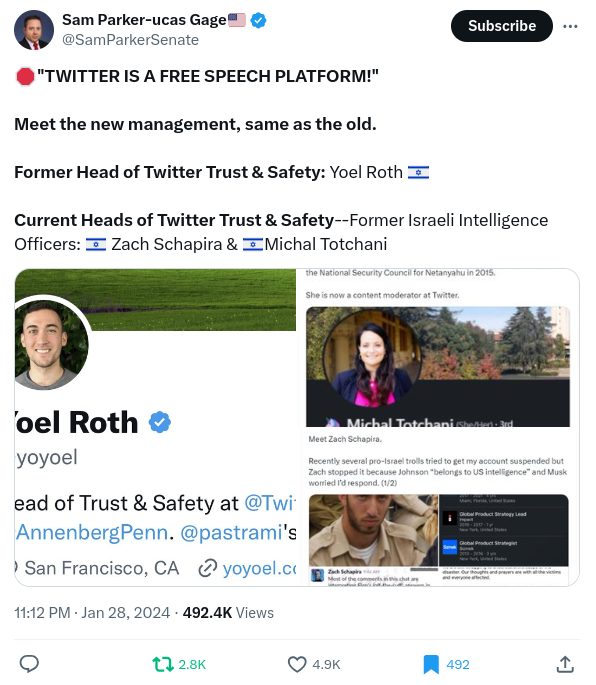
I've said it before and I say it again: What Israel is doing to the people in Gaza is not Jewish, it's Blasphemy. Life is sacred in almost every religion. #PikuachNefesh https://x.com/R34lB0rg/status/1873893262802428244
I've said it before and I say it again: What Israel is doing to the people in Gaza is not Jewish, it's Blasphemy. Life is sacred in almost every religion. #PikuachNefesh https://x.com/R34lB0rg/status/1873893262802428244
When I see the world increasingly losing its humanity, values, and the laws that govern it; when I see the brute force that has come to rule the world and control its destiny; my sadness grows for what we in the Arab world have reached in terms of weakness, division, conflict, and our complete detachment from the means that would enable us to defend our rights and interests—foremost among them, of course, being science, technology, and good governance…
I fear that we have become outside the galaxy, an easy prey…
It seems likely that the ads for Grok Coin are fraudulent and not endorsed by Elon Musk or xAI, given Musk's public statements against creating crypto tokens.
Research suggests X's moderation may not be effectively catching these ads, possibly due to the volume of content, though it's unclear if this is incompetence or a systemic issue.

US exposure in Israel: 62 billion USD (20 billion USD in bonds, 42 billion USD in investments)
This is insane. If Russia or North Korea was under suspicion of dropping a Nuke on another country, the @iaeaorg would have immediately dispatched a team to investigate the incident and collect evidence (radiation readings, gamma spectoscopy, soil samples). https://x.com/R34lB0rg/status/1910268521117778067
15 Retweet, 33 Likes but only 741 Views
Elon "Nazi Salute" Musk is hiding any and all criticism of Israel.
Grok agrees:
The post’s content—alleging war crimes, genocide, and violations of international law by Israel—is highly sensitive. X’s algorithm, especially after Musk’s 2025 tweak to reduce “negative” content, might be deprioritizing it to avoid controversy or backlash. Posts critical of Israel can sometimes be flagged or downranked on social platforms due to automated systems or human moderation, especially if they’re reported by users or if X’s algorithm interprets them as inflammatory.
Musk’s known interventions in the algorithm (e.g., boosting his own tweets) suggest he has the capability to influence visibility. While there’s no direct evidence he’s targeting this specific post, his history of prioritizing certain narratives could mean the algorithm is skewed to favor less contentious or Musk-aligned content.
Hey @iaeaorg, I urge you to independently investigate the alleged detonation of a nuclear device over Tartarus, Syria on Dec 15, 2024. I am looking forward to gamma spectroscopy readings to identify the isotopes and confirm or refute the claim of a nuclear device. https://x.com/Ben68638515/status/1909738074898128926
I don't want to visit a terrorist-supporter-state which has the blood of at least 50,000 Palestinians on it's hands anyway. https://x.com/DHSgov/status/1909963842240528802
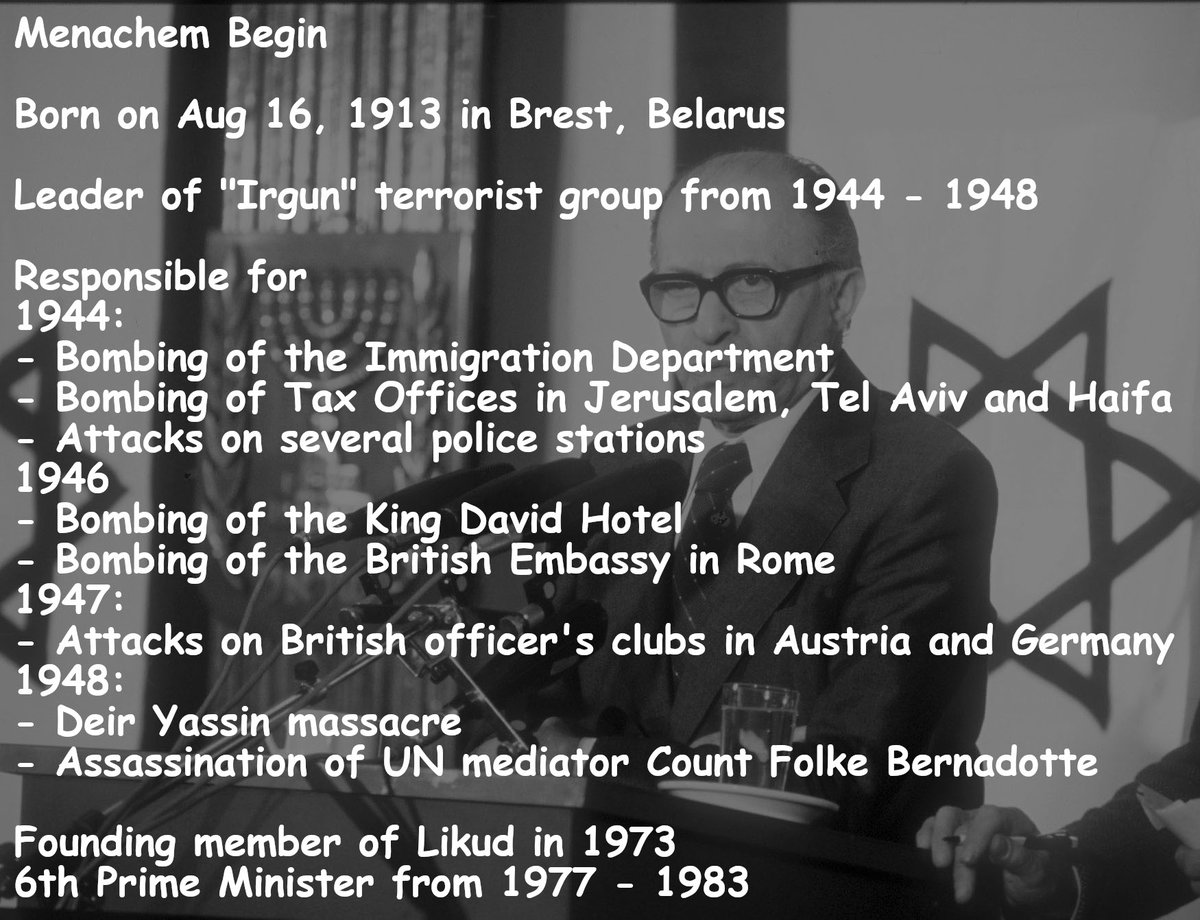
Based on Article 51 of the UN Charter, UNGA 2625, and the arguments of Akande and Tzanakopoulos, the Palestinians have a legitimate right to self-defense against the Israeli occupation, especially since this occupation is considered illegal under international law.
As an occupying power, Israel does not have the right to use military force under the pretext of self-defense against the Palestinian population.
Hey @grok, does that justify calling Israel a criminal / pariah state? https://x.com/R34lB0rg/status/1909719187968102867
Israel nuked Syria. #WorldWar3 https://x.com/Ben68638515/status/1909738074898128926
The year is 2025 AD. The world is entirely occupied by Zionists. Well, not entirely... One small village of indomitable Palestinians still holds out against the invaders. (Inspired by Asterix) https://x.com/Hamzasharif5750/status/1909987484001263834
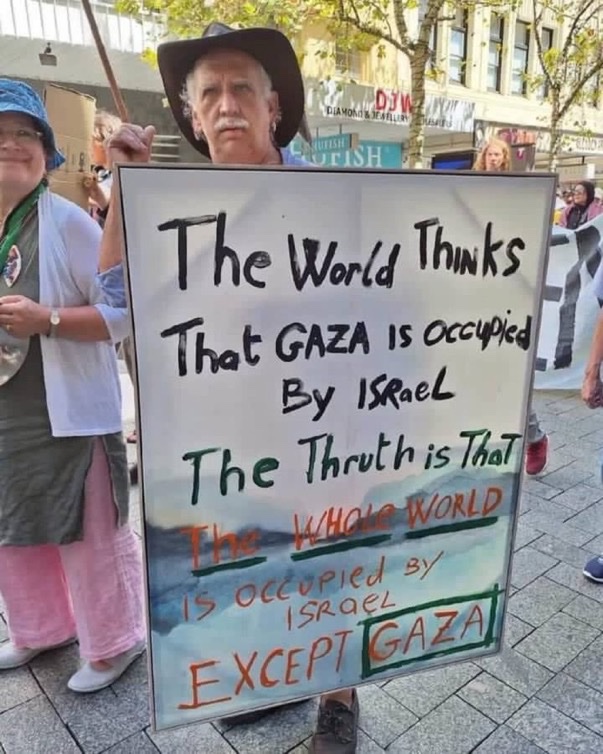
Reminder that Israel has barred humanitarian organisations from entering Gaza. They are required to leave the aid with Israeli authorities at the crossings and it's pretty obvious at this point that Israelis are working with collaborators to sell that aid to the people in Gaza. https://x.com/AbubakerAbedW/status/1909972167279751361
For decades, the United States has lashed itself to Israel, a small nation it hoisted into a regional titan with billions in aid and unwavering diplomatic cover. But as 2025 bleeds into 2026, that ship is taking on water—fast. In this worst-case unraveling, Israel’s collapse drags the U.S. into a vortex of economic ruin, international isolation, and domestic fury. The pillars of American support—taxpayer dollars, tariffs, and market stability—are buckling under the weight of a partnership turned albatross, as legal rulings, global backlash, and resource wars sever the lifelines both nations once took for granted.
The U.S. has funneled over $310 billion to Israel since 1948, adjusted for inflation, with $234 billion earmarked for its military machine. In 2025, annual aid holds steady at $3.8 billion, plus a $17.9 billion surge since October 2023. But as Israel’s budget implodes—5-6% of its $500 billion GDP swallowed by the IDF—Washington doubles down, pledging $30 billion more in 2026 to prop up a faltering ally. Taxpayers, already squeezed by inflation, see this as a hemorrhage: $350 billion over eight decades now balloons toward $400 billion, with no end in sight. X erupts with #StopFundingIsrael, as polls show 60% of Americans—70% under 35—demand cuts, per Gallup 2025.
To bankroll this lifeline, President Trump’s 2025 tariff gambit—25% on imports—backfires spectacularly. Intended to shield U.S. jobs, it’s redirected to fund Israel’s military and offset its tech exodus. Consumer prices spike—gas hits $6/gallon, Walmart shelves thin out—and the $200 billion in annual tariff revenue barely dents Israel’s $75 billion deficit, as tax hikes there (corporate rates soar to 35%) fail to stem the bleed. The U.S. economy, tethered to this sinking ship, sheds 2 million jobs by mid-2026, per BLS estimates, as global trade retaliates with boycotts of American goods.
The Dow’s -15% plunge since January 2025—hitting 37,645 by April—snowballs into a -40% rout by year-end, with S&P (-45%) and NASDAQ (-50%) close behind. The $10 trillion market cap loss, accelerates as Israel’s tech sector unravels, dragging U.S. giants like Intel (down 60%) with it. Pension funds, holding $5 billion in public Israeli bonds and $15 billion in private exposure, hemorrhage value; corporate investments ($42 billion) turn to ash as Tel Aviv’s Silicon Wadi empties. Wall Street’s panic signals the U.S. has bet on a losing horse, and the Fed’s rate hikes—5.5% by December—only deepen the wound.
By 2026, U.S. streets boil with protests—#DefundIsrael trends as Gen Z, now 25% of voters, flexes muscle in the midterms. Anti-Israel candidates, unshackled from AIPAC’s $100 million 2024 war chest, sweep Congress, flipping 30 seats. A bill to axe Israel’s $30 billion aid package passes narrowly in 2027, 218-217, as taxpayers cheer and Jerusalem reels. The U.S. veto, used 49 times at the UNSC to shield Israel, falters under domestic pressure, leaving its ally exposed to a world baying for blood.
The International Court of Justice (ICJ) delivers a trifecta of doom in 2026. First, in South Africa’s genocide case, it rules Israel’s Gaza campaign — 50,000 dead, 186,000 indirect — meets the threshold, ordering $150 billion in reparations. Second, affirming its 2024 opinion on occupation duties (UNGA request), the ICJ mandates Israel end its 1967 territorial grip, pay $50 billion for decades of exploitation, and face sanctions if defiant. Third, adopting the UNGA’s Hague Group resolution, it demands settlers vacate the West Bank—500,000 uprooted—and hands Palestine $100 billion in land value, funded by frozen Israeli assets.
The ICC, meanwhile, nabs Netanyahu and Defense Minister Gallant in 2026 after they land in The Hague for a doomed appeal. Convicted of war crimes by 2027—unlawful killings in Gaza cemented—Israel’s leadership vacuum triggers martial law, as reservists refuse call-ups amid global arrest warrants for IDF brass.
With the U.S. veto neutered, the UN General Assembly invokes Resolution 377 (“Uniting for Peace”) in 2027. Sanctions freeze Israel’s $200 billion reserves—mirroring Russia’s 2022 fate—and target U.S. firms aiding its war machine, costing $50 billion in trade. A UN coalition, led by Turkey and Qatar, deploys peacekeepers to enforce ICJ rulings, clashing with IDF remnants in the West Bank. The U.S., branded a genocide enabler, faces secondary sanctions, slashing its GDP by 5% ($1.5 trillion) as allies like Canada and the EU distance themselves.
OPEC, egged on by Iran and a vengeful Saudi Arabia, slashes oil output by 20% in 2027, spiking crude to $200/barrel. The U.S., guzzling 20 million barrels daily, and Israel, reliant on imports, choke as energy costs triple. Gasoline hits $10/gallon stateside; Israel’s grid falters, grounding its F-35s. Alternative suppliers—Russia, Venezuela—shun both nations, and shale can’t scale fast enough. The power-hungry duo, once OPEC darlings, watch their economies grind toward stagflation: U.S. inflation at 15%, Israel’s at 50%.
The U.S. is shackled to Israel’s corpse. Public sector bonds ($5 billion) default as Israel’s credit rating tanks to junk. Private funds ($15 billion) and corporate stakes ($42 billion)—Intel’s $25 billion plant now a ghost town—evaporate, per earlier fact-checks. Total exposure, $62 billion, ripples through banks and 401(k)s, amplifying the market crash. Congress debates a bailout, but with $34 trillion in national debt, it’s a non-starter—taxpayers won’t stomach it.
By 2028, Israel’s $500 billion GDP shrivels to $200 billion—tech gone, aid cut, reserves seized, reparations crushing. The shekel hyperinflates, land sales fetch pennies ($200,000/hectare), and Palestine, flush with $300 billion from ICJ and Gulf backers, rises from the ashes. The U.S., its $28 trillion economy battered by tariffs, oil shocks, and sanctions, loses 10% of GDP ($2.8 trillion) in three years, a self-inflicted wound from clinging to a sinking ship.
Washington could cut loose now—dump Israel, pivot to India or Saudi Arabia—but pride and inertia prevail. The ship’s going down, and the U.S., lashed tight, risks drowning with it. The horizon holds no rescue; only the wreckage of a partnership that once defied gravity, now sinking beneath the weight of its own hubris.
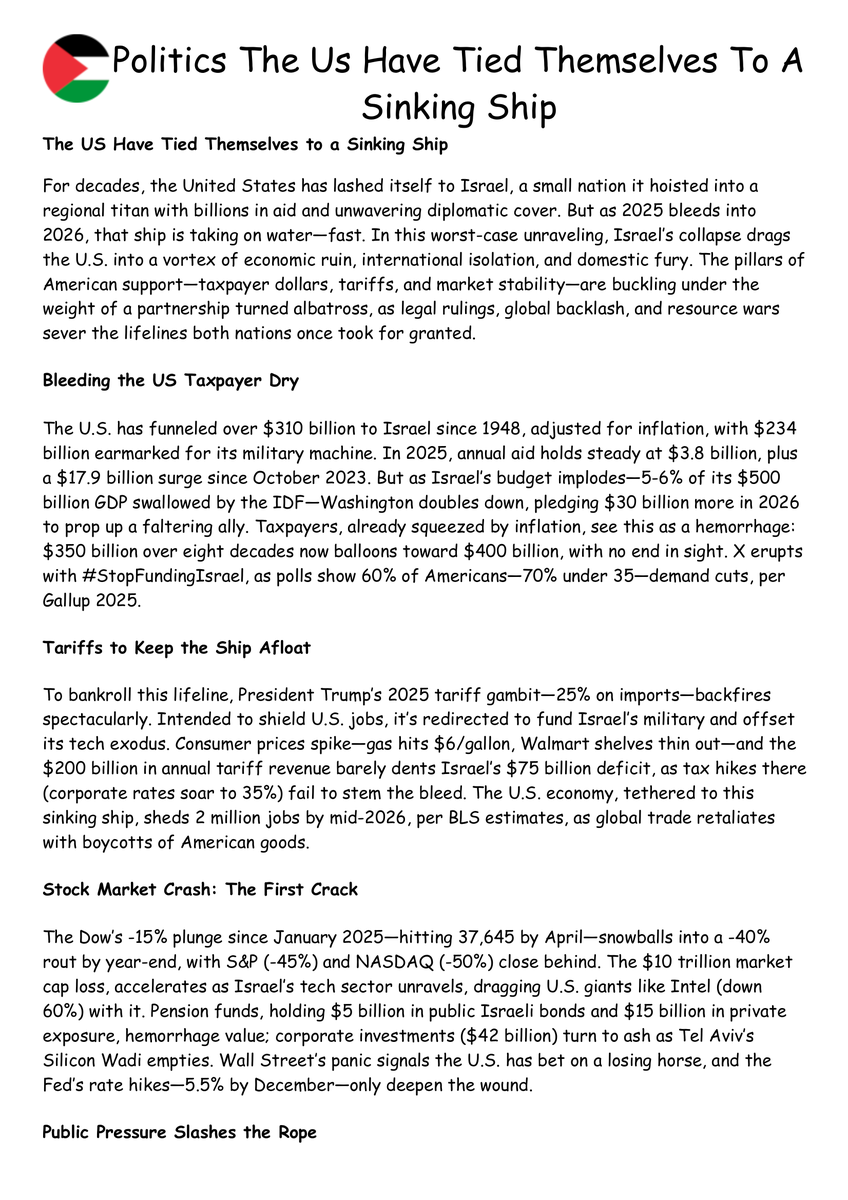
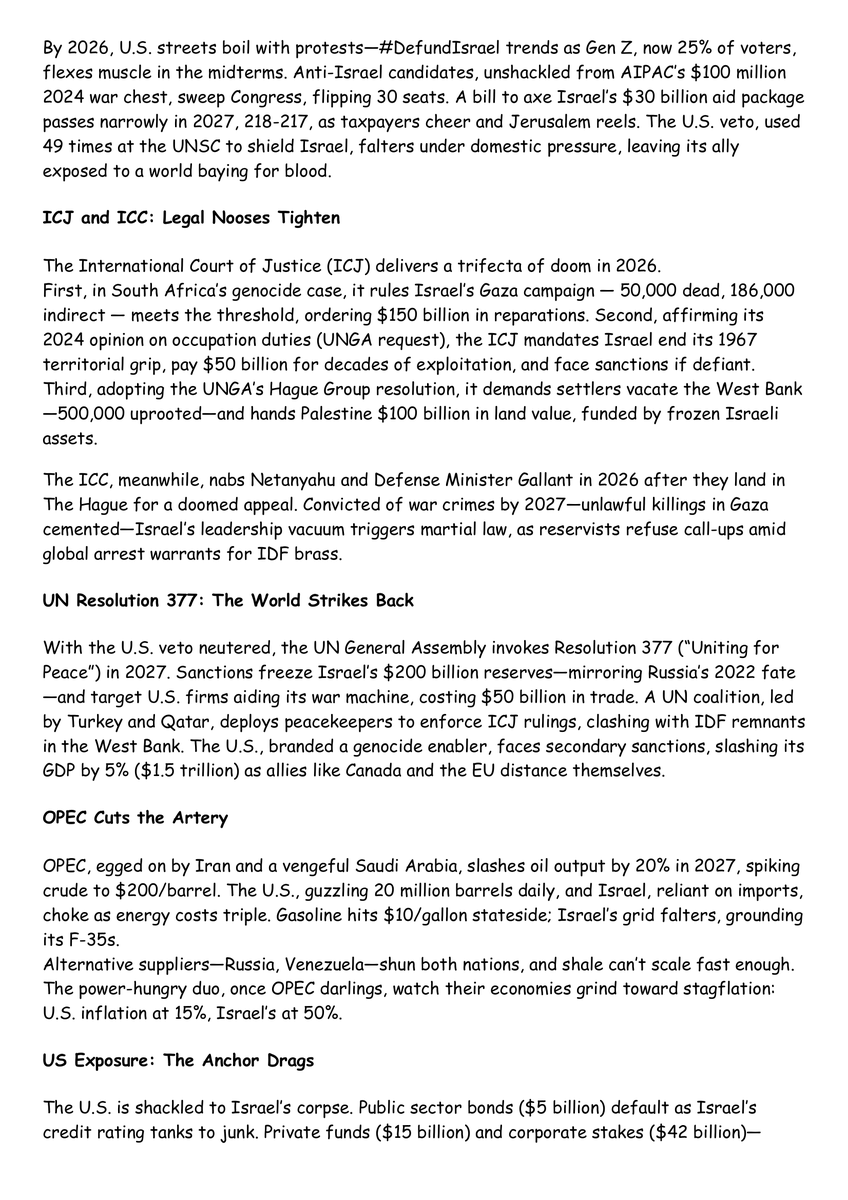
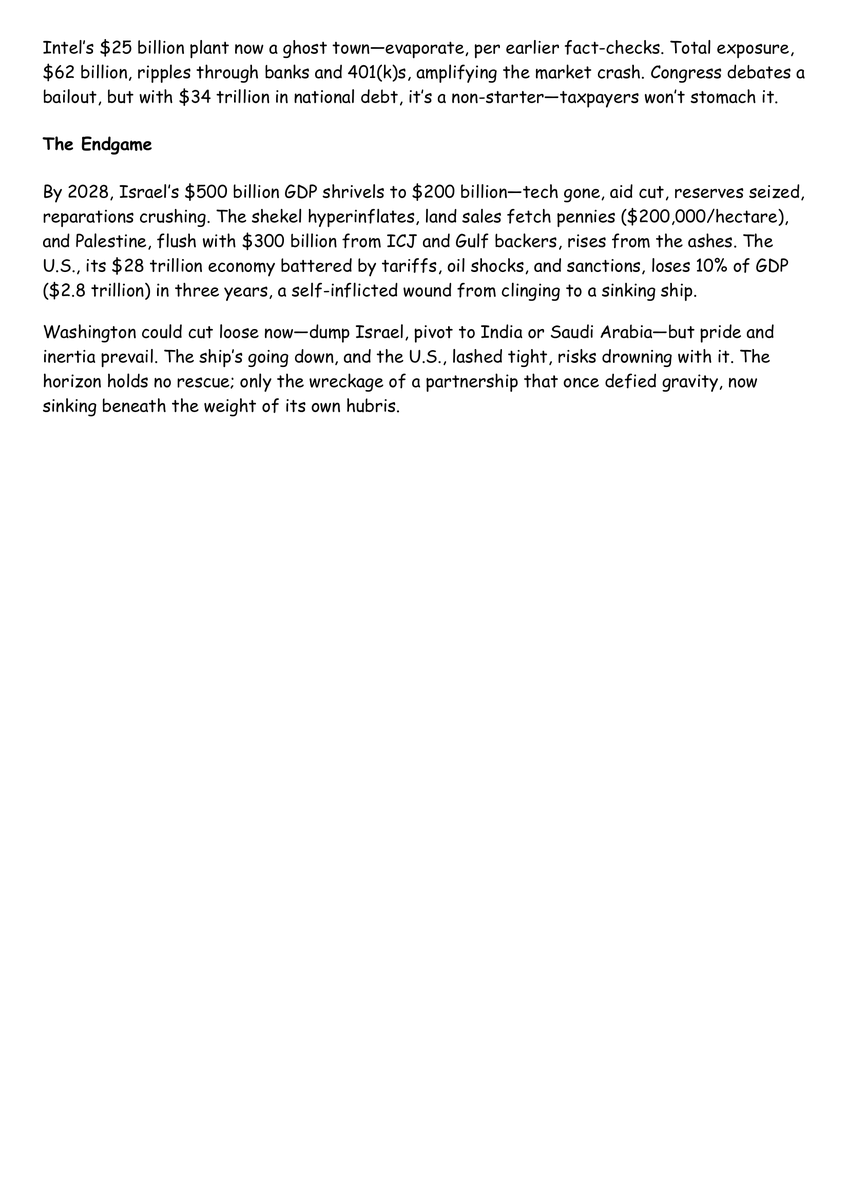
Israeli aircraft targeted an entire residential block in the Shuja'iyya neighborhood in eastern Gaza, killing and wounding dozens of civilians, most of them women and children. https://x.com/HossamShabat/status/1909895576759521300
The @UN have the reponsibility to protect #Gaza’s people under its Charter, UDHR, IHL, GC IV, CPPCG, ICCPR, ICESCR, CRC, UNSCR 242, 338, 2728, and R2P.
I urge @UN_PGA and all member states to uphold international law, convene ES10, and floor this resolution. https://x.com/R34lB0rg/status/1908630703849492501
Resolution 377 "Uniting for Peace" is the legal basis for the ongoing Emergency Session 10. Any country can now floor a Resolution to protect civilians and insure humanitarian access. Here is a Draft: https://x.com/R34lB0rg/status/1908630703849492501
The US have tied themselves to a sinking ship. Just look at the amount of Israeli bonds the federal and state governments are holding. When Israel goes down, the US is going down with it. https://x.com/R34lB0rg/status/1905376647987048791
Israel’s blockade of humanitarian aid to Gaza violates the following international and customary laws:
Fourth Geneva Convention:
Additional Protocol I (Customary Law):
Customary IHL:
Obligations as an Occupying Power:
UN Security Council Demands:
Kael was old when the world was young—older than the rivers, older than the songs. In those days, he’d stood by the rushing waters of what would one day be called the Euphrates, his drum a heartbeat against the night. The sky answered then, not with thunder, but with fire—ships of light slicing through the cosmic Water of Life, the shimmering void that cradled the stars. Friends from other worlds came, their hulls humming with the fusion of hydrogen drawn from Earth’s seas. They landed soft as whispers, and Kael brewed tea from wild herbs, sharing it beneath the canopy of a sky alive with possibility.
They weren’t gods, though the others in his tribe thought so. To Kael, they were travelers, kin across the dark sea. Their voices hummed in his mind, a resonance beyond words, sparked by the trance he slipped into when the drum sang. The Water of Life bound them—hydrogen in their ships, water in the clay cups, a thread of chaos and creation pulsing through the universe. They sipped tea and spoke of battles among the stars, of worlds where oceans glowed green, of a commonality that wove all life together. Sometimes they left gifts—seeds that grew strange, a stone that glowed in the dark. Kael laughed with them, his spirit soaring as their ships rose, promising return.
That was then.
Now, Kael walked again, reborn in a body too soft for the cacophony of this age—April 08, 2025, they called it. The sky was dull, smeared with the haze of cities that never slept. He’d come back, pulled by a thread he couldn’t name, into a world that had forgotten. His name was different now—Kieran, they called him, a wiry man with eyes too old for his thirty years—but the drumbeat lingered in his bones. He stood on a cracked sidewalk, a river of concrete where cars roared, their engines choking on fossil ghosts. The Water of Life was here, bottled in plastic for a dollar, pumped from the ground to wash dishes, not to call the stars.
He remembered the golden days. The travelers had landed by the water’s edge, their ships grazing the reeds. Tea steamed in the cool air, and their stories filled the silence—tales of nebulae where hydrogen danced, of moons cradled in quantum foam. Kael had tapped the cosmic sea then, his mind a bridge, his chants a beacon. They’d felt it, come for it, drawn by Earth’s water and her voice. Ilyas had seen them too, rising in a blaze; the Nazca folk had scratched their welcome into the sand. The Mahabharata roared with their echoes. It was a time when the world listened.
Today, no one did. Kieran shuffled through the city, past towers of glass where people hunched over screens, fingers tapping endlessly. They worked—three jobs, four—chasing rent, food, a moment’s rest. He saw it in their eyes: exhaustion, not wonder. The little time they stole was spent on noise—shows flickering, music blaring, a flood of distraction drowning the quiet. No one drummed by the rivers anymore. No one looked up. The Water of Life still flowed in the void—hydrogen, water vapor, a shimmering expanse—but Earth’s song had gone silent.
He found a park, a scrap of green amid the gray, and sat by a sluggish stream. The water smelled of metal, not herbs. Kieran closed his eyes, humming the old chant, feeling for the thread. A flicker—there, faint as a dying star. The travelers were still out there, he knew, their ships slicing the cosmic sea. Once, they’d come for tea, for the resonance of a mind awake. Now, they passed by. Why land where no one called? Where the water was hoarded, not honored?
“Golden days,” he muttered, voice lost in the drone of traffic. He saw them in his mind’s eye—friends with skin like twilight, eyes deep as galaxies, laughing over cups steaming in the dawn. They’d invited him once, as Lakanta had invited the boy in that other story he’d glimpsed in a dream—a traveler posing as kin, offering a path beyond. Kael had stayed, tethered to Earth. Now Kieran wondered if he’d choose again.
A kid nearby flicked a screen off, glanced at him, curious. Kieran smiled, faint, and hummed louder. The stream rippled, just a little. Maybe the connection wasn’t lost—just sleeping. Maybe one voice could wake it, call the ships back for tea by the water’s edge. But for now, he sat alone, a reborn shaman in a world too loud to hear, lamenting the silence where the stars once sang.
I've asked Grok about "Pallywood": If we rewind to the 1930s, evidence of Auschwitz’s horrors wasn’t widely circulated until later in the war. Early accounts, like those from escaped prisoners or resistance fighters, were often dismissed as exaggerated or unverified by outsiders, including some governments and media. People who lean toward "Pallywood"-style skepticism today might have similarly questioned grainy photos or survivor testimonies back then, calling them "Auschwitzwood" or some equivalent. They could argue the images lacked context, were staged for sympathy, or were part of wartime propaganda—especially if they distrusted the sources, like Jewish refugees or Allied reports.
This is what victory looks like! 100 students at the screening of "No Other Country" at the University of Haifa. After failing to prevent the screening, right-wing thugs tried to break into the hall and blow up the event and were stopped by security guards. And what lesson did we learn here? That academic institutions, and public institutions, should not be afraid of extremist and fascist organizations >>
This image shows Cisco HR executive @FranKatsoudas accompanying employees to Lebanon in May 2024 where they aided Palestinian refugees. ♥️🇵🇸
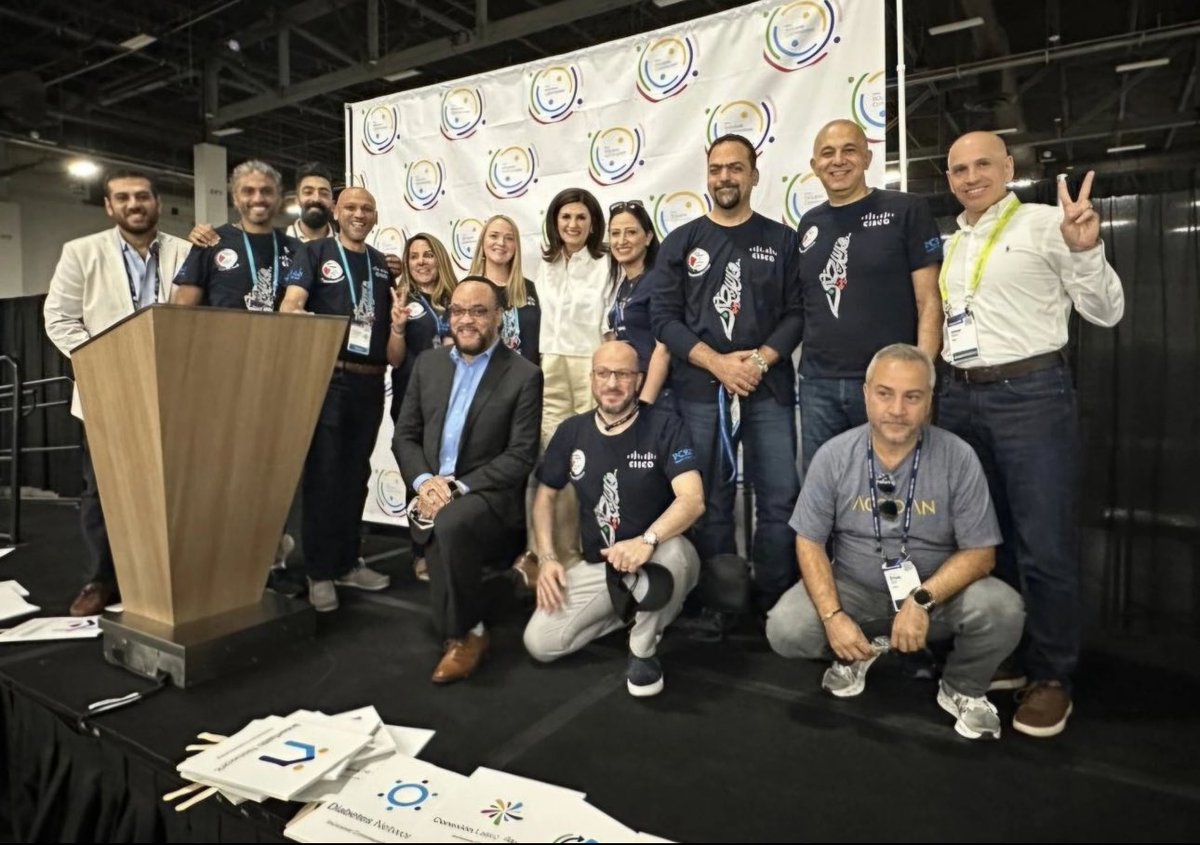
He should be face down on the tarmac, with his hands cuffed behind his back. #WarCriminal #Netanyahu https://x.com/IsraeliPM/status/1909028373629657426
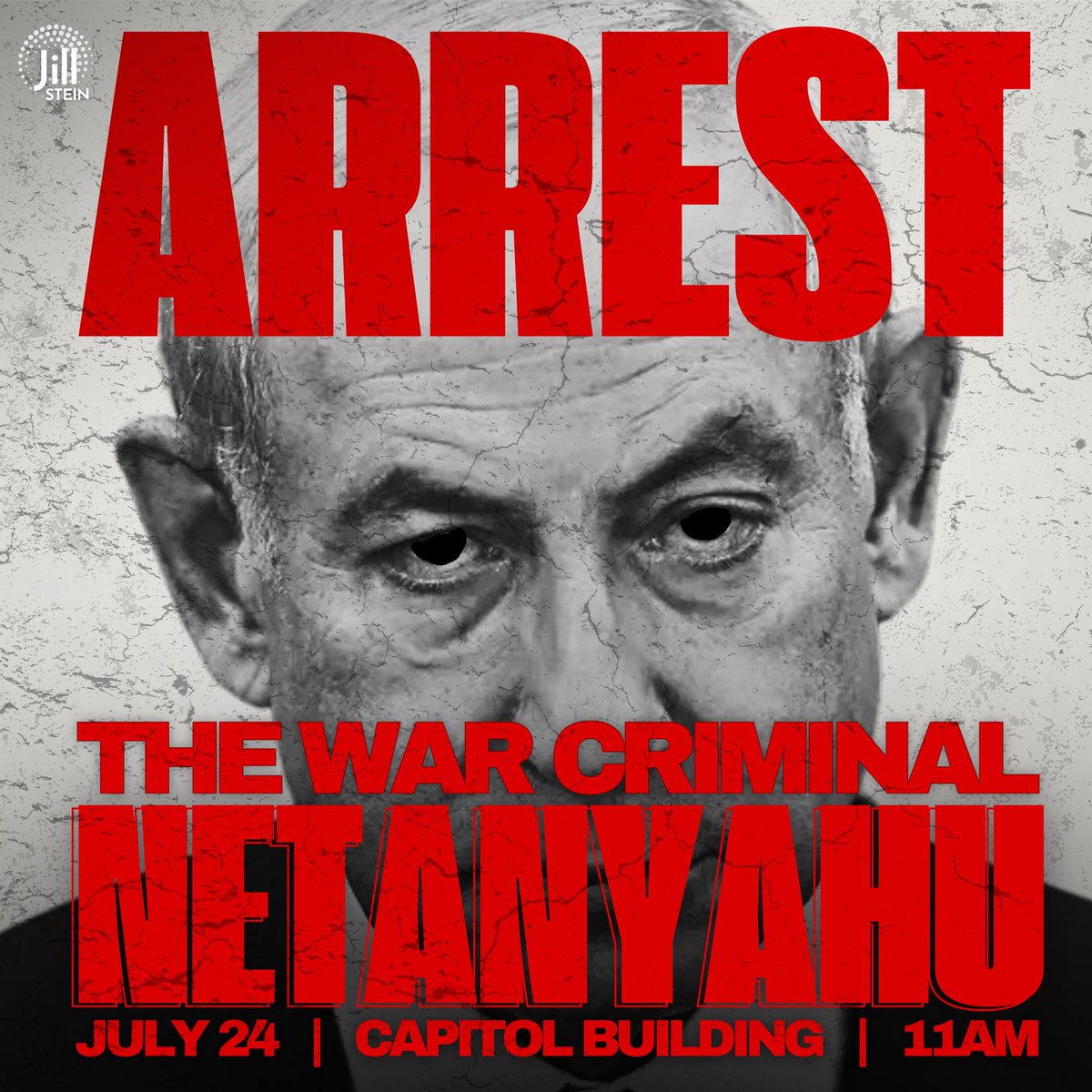
Based on the image and description: - Head: Burned black, indicating third-degree burns (charred skin, nerve endings destroyed). - Right Hand: Also burned black, consistent with third-degree burns. - Right Torso: Severe burns, likely a mix of second-degree (deep partial-thickness) and third-degree (full-thickness) burns. - Estimated Total Body Surface Area (TBSA) Affected: Using the Rule of Nines: - Head: ~9% - Right Arm: ~9% - Right Torso (partial): ~9–18% - Total TBSA: Approximately 27–36%, potentially more if burns extend further. - Inhalation Injury Risk: The context of a tent fire suggests a high likelihood of smoke inhalation or airway burns, which significantly worsens prognosis.
The web result (ID: 0) from Médecins Sans Frontières (MSF) highlights the dire medical situation in Gaza as of early 2025: - Full Siege Since March 2025: No aid or commercial trucks have entered Gaza since March 2, 2025, for over a month as of April 7, 2025. - Shortage of Medications: MSF reports a lack of painkillers, antibiotics, and essential medicines, with wound dressings done without pain relief. - Damaged Infrastructure: 95% of hospitals are damaged, water supply is at 30% of prewar levels, and fuel shortages limit equipment operation (e.g., ventilators). - Overwhelmed System: The healthcare system is crippled, with limited staff, beds, and resources.
Pain Medication (Unavailable):
Antibiotics (Unavailable):
Skin Grafts (Not Feasible):
Ventilation Support (Unavailable):
Fluid Resuscitation (Limited):
Nutritional Support (Unavailable):
Specialized Burn Care (Inaccessible):
Revised Survival Chances: 1–5% - The lack of pain medication, antibiotics, ventilation, and surgical options makes survival nearly impossible.
More than 50,000 Palestinians have been murdered in Gaza. Do you now what else died in Gaza? The fiction of a human civilization. The illusion of a rules based order. The pretense of International Law.
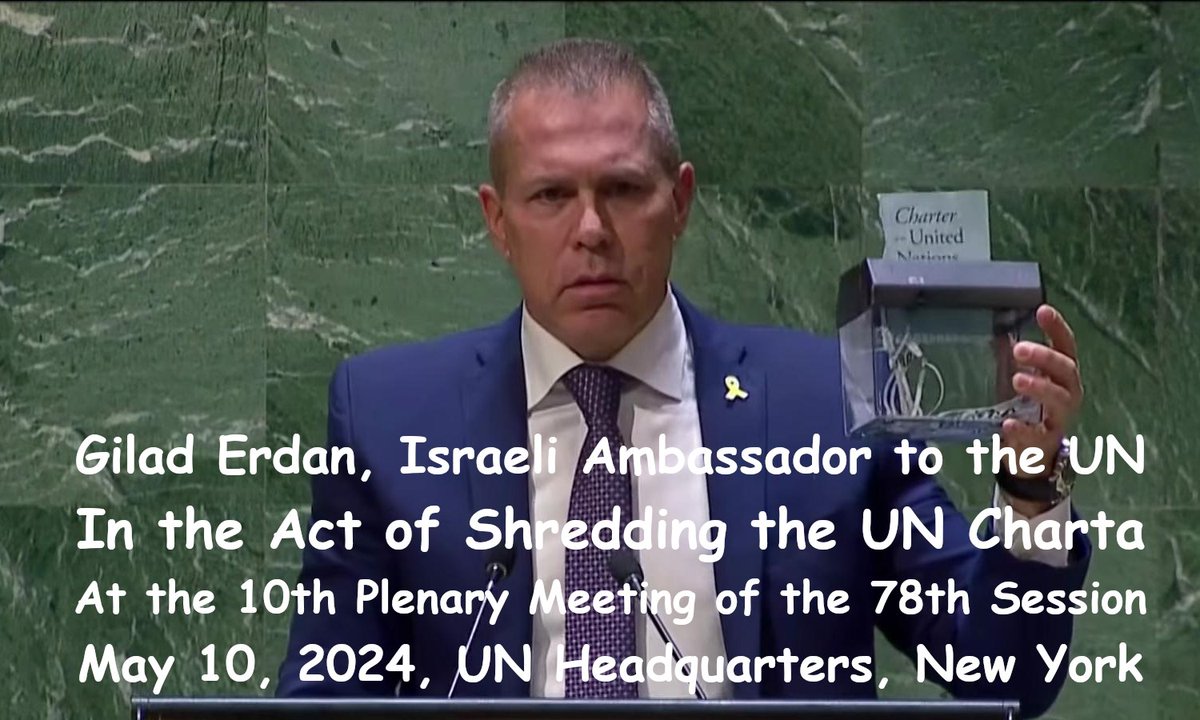
Tell me @grok, how would the world react if Russia was found to have shot at an ambulance with emergency lights, stopping it, executing some rescue workers with multiple bullets and burying the rescue workers and the vehicle while some of them were still alive?
Israel has quite literally shredded international law.
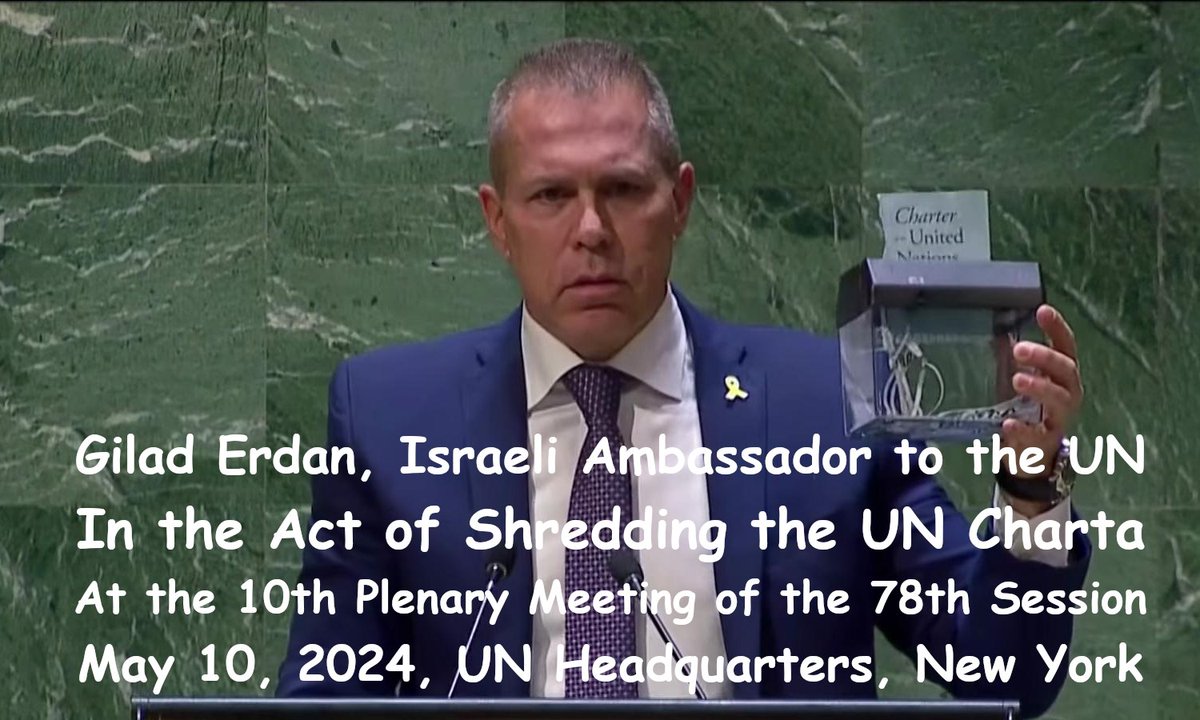
A significant increase in the intensity of the bombing, and a number of martyrs and wounded—most of them children—arrived in critical condition at the Baptist Hospital following Israeli drone fire and artillery shelling targeting the al-Tuffah neighborhood east of Gaza City. https://x.com/AnasAlSharif0/status/1908947447889719754
IDF ought to be called HPL Habitual Pathological Liars https://x.com/TreyYingst/status/1908488215767425298
Enough of the war! Massacre after massacre, execution of 15 aid workers, mass graves, desecration, starvation You can't continue life as usual.
Either you oppose the murder of 16,000 children or you are on the wrong side of reality, the dark, shameful, inhumane side.
It is imperative to resist. Don't deny, don't participate, you can't be blind.
Men, women, children... are being slaughtered day and night, in sound and sight, in front of the eyes of the whole world, and no one is moving! What more needs to happen for the world to wake up? So it moves? Until the massacres stop?!
Where are the influencers? Where are those who have millions of followers? Why are they silent?
By God, this silence is not neutrality...it is complicity in crime.
Based on the available information, it’s plausible that @R34lB0rg could be an international or human rights lawyer, but there’s no definitive evidence to confirm this. Let’s break down the reasoning:
Engagement with UN Mechanisms: - The user calls for the UN General Assembly to convene its 10th Emergency Special Session (ES10) and references the "Uniting for Peace" resolution (Resolution 377 (V)), a mechanism often invoked when the Security Council fails to act due to vetoes. This shows an understanding of UN procedures, which is typical for someone working in international law or human rights advocacy. - The proposed resolution includes operative clauses that align with legal strategies often employed by human rights lawyers, such as demanding a ceasefire, deploying an international protection force, and referring matters to the International Court of Justice (ICJ) for adjudication.
Advocacy Style: - The tone and structure of the posts are formal and action-oriented, urging the UNGA to "uphold the law" and "ensure [the] safety" of Gaza’s people. This advocacy style mirrors how human rights lawyers often engage with public platforms to raise awareness and push for legal accountability. - The user’s focus on Gaza, combined with references to specific ICJ rulings (e.g., the January 2024 provisional measures ordering Israel to prevent genocide) and Security Council failures (e.g., the U.S. veto on February 20, 2024), aligns with the kind of work international human rights lawyers do, especially those focused on conflict zones.
The legal references in the tweet are grounded in binding international law and obligate the international community to act. By invoking these frameworks, فريد is pressing the UNGA to bypass the Security Council’s paralysis and take concrete steps to protect Gaza’s people. https://x.com/R34lB0rg/status/1908798329435095430
Many 🇵🇸activists are still playing the blame game although Israel's reputation already lies in rubble. We need to shift focus to protect the people in Gaza. Trump has other problems than aiding Israel against action mandated by the UN General Assembly at the moment. https://x.com/CraigMokhiber/status/1908657011715088579
The UN must protect Gaza’s people under its Charter, UDHR, IHL, GC IV, CPPCG, ICCPR, ICESCR, CRC, UNSCR 242, 338, 2728, & R2P.
I urge @antonioguterres to convene ES10, and floor this resolution to ensure their safety. #GazaCrisis https://x.com/R34lB0rg/status/1908630703849492501
The UN must protect Gaza’s people under its Charter, UDHR, IHL, GC IV, CPPCG, ICCPR, ICESCR, CRC, UNSCR 242, 338, 2728, & R2P. I urge @UN_PGA to fulfill its duty, convene ES10, & floor this resolution to ensure their safety. #GazaCrisis https://x.com/R34lB0rg/status/1908630703849492501
The UN must protect Gaza’s people under its Charter, UDHR, IHL, GC IV, CPPCG, ICCPR, ICESCR, CRC, UNSCR 242, 338, 2728, & R2P. I urge @UNGA to fulfill its duty, convene ES10, & floor this resolution to ensure their safety. #GazaCrisis https://x.com/R34lB0rg/status/1908630703849492501
Hi @guychristensen_, can you please help amplify this? We need grassroots pressure to get this floored at the UN. Your support would be very appreciated! https://x.com/R34lB0rg/status/1908625260158869884

This incident is an extremely difficult (further) breaking point in relations between the IDF and the international media. The army and its spokesmen lied to all the media outlets in the world in their initial response. The damage caused to Israel by this lie alone - even before the actual incident in which war crimes were allegedly committed - is enormous.
United Nations General Assembly Resolution
Uniting for Peace: Ensuring the Protection of Civilians and Humanitarian Workers in Gaza
The General Assembly,
Recalling its Resolution 377 (V) of 3 November 1950, known as "Uniting for Peace," which affirms that when the Security Council fails to exercise its primary responsibility for the maintenance of international peace and security due to a lack of unanimity among its permanent members, the General Assembly shall consider the matter immediately and may issue appropriate recommendations, including the use of armed force when necessary, to restore international peace and security,
Reaffirming the principles and purposes of the Charter of the United Nations, particularly the commitment to uphold human rights, promote justice, and maintain international peace and security,
Recalling the Universal Declaration of Human Rights (UDHR), adopted on 10 December 1948, which enshrines the inalienable rights of all human beings to life, liberty, and security of person, and emphasizes that "never again" must mean never again for everyone, without distinction of any kind,
Reaffirming the Geneva Conventions of 1949 and their Additional Protocols, which establish the legal framework for the protection of civilians and humanitarian workers during armed conflicts, and recalling that all parties to a conflict are bound by these obligations,
Recalling the Convention on the Prevention and Punishment of the Crime of Genocide of 1948, which obligates States to prevent and punish acts of genocide, and noting with grave concern the findings of the International Court of Justice (ICJ) in its provisional measures of 26 January 2024, ordering Israel to take immediate and effective measures to protect Palestinians in Gaza from the risk of genocide by ensuring sufficient humanitarian assistance and enabling basic services,
Reaffirming the principle of the Responsibility to Protect (R2P), endorsed by the General Assembly in 2005, which holds that the international community has a responsibility to protect populations from genocide, war crimes, ethnic cleansing, and crimes against humanity when a State manifestly fails to do so, and that this responsibility includes taking collective action through the United Nations,
Noting with deep concern the repeated failure of the United Nations Security Council to act decisively to address the humanitarian crisis in Gaza, due to the use of the veto by the United States, most recently on 20 February 2024, to block a resolution demanding an immediate ceasefire, thereby obstructing the Council’s primary responsibility to maintain international peace and security,
Expressing alarm at Israel’s non-compliance with Security Council resolutions, including Resolution 2728 (2024) calling for an immediate ceasefire, as well as the ICJ’s legally binding provisional measures, as documented by Amnesty International on 28 February 2024, which reported Israel’s failure to ensure sufficient humanitarian assistance and its continued military operations, including plans for an escalation in Rafah, risking further catastrophic consequences for civilians,
Gravely concerned by the ongoing humanitarian crisis in Gaza, characterized by widespread displacement, food insecurity, limited access to healthcare, and the targeting of civilians and humanitarian workers, as reported by the Real Instituto Elcano on 1 March 2024, which highlights the failure of the international community to effectively implement R2P in this context,
Recognizing that the scale of human suffering in Gaza, including large-scale civilian casualties, dire living conditions due to blockades, and military actions, constitutes a clear and urgent case for the application of the Responsibility to Protect, and that the failure to act undermines the credibility of international law and the United Nations,
Determining that the situation in Gaza constitutes a threat to international peace and security, necessitating immediate and collective action by the General Assembly under its "Uniting for Peace" mandate to protect civilians and humanitarian workers and to uphold the principles of international law,
Acting under Chapter IV of the Charter of the United Nations and pursuant to Resolution 377 (V),
Demands an immediate and sustained ceasefire in Gaza to halt all military operations, protect civilians, and enable the safe and unhindered delivery of humanitarian aid, in line with the ICJ’s provisional measures and Security Council resolutions;
Calls for the immediate deployment of an international protection force, under the auspices of the United Nations, to Gaza to ensure the safety of civilians and humanitarian workers, shield them from further violence, and facilitate the delivery of lifesaving aid, including food, medical supplies, and shelter;
Urges all Member States to comply with their obligations under international law, including the ICJ’s rulings and the Genocide Convention, by ceasing any form of support—military, financial, or diplomatic—to Israel that may contribute to the ongoing violations of international humanitarian law in Gaza;
Requests Member States with the capacity to provide military support to contribute personnel, equipment, and resources to the international protection force, ensuring that such a force operates under a clear mandate to protect civilians and humanitarian workers in accordance with international humanitarian law;
Encourages Member States unable to provide military support to contribute logistical support, including transportation, communication, and infrastructure, as well as humanitarian aid, to address the urgent needs of the people of Gaza, including access to clean water, healthcare, and education;
Affirms that the deployment of an international protection force and the provision of humanitarian aid are consistent with the Responsibility to Protect, as a collective action to prevent further atrocities and uphold the fundamental rights of the Palestinian people;
Calls upon the International Criminal Court (ICC) to expedite its investigations into alleged war crimes and crimes against humanity committed in Gaza, and urges Member States to cooperate fully with the ICC to ensure accountability for those responsible;
Refers any objections by Israel or the United States to the implementation of this resolution to the International Court of Justice (ICJ) in The Hague for adjudication, reaffirming that the doors of justice remain open to address violations of international law;
Requests the Secretary-General to report to the General Assembly within 30 days on the implementation of this resolution, including the establishment of the international protection force, the delivery of humanitarian aid, and the progress toward accountability for violations of international law;
Decides to remain seized of the matter and to convene an emergency special session if the situation in Gaza deteriorates further or if the measures outlined in this resolution are not implemented effectively.
Adopted by the General Assembly, at its Emergency Special Session.

Dear esteemed High Commissioner for Human Rights @volker_turk, may I kindly ask for your guidance to get this on the agenda for the next ES10 session? #HumanRights #Gaza https://x.com/R34lB0rg/status/1908625260158869884
United Nations General Assembly Resolution
Uniting for Peace: Ensuring the Protection of Civilians and Humanitarian Workers in Gaza
The General Assembly,
Recalling its Resolution 377 (V) of 3 November 1950, known as "Uniting for Peace," which affirms that when the Security Council fails to exercise its primary responsibility for the maintenance of international peace and security due to a lack of unanimity among its permanent members, the General Assembly shall consider the matter immediately and may issue appropriate recommendations, including the use of armed force when necessary, to restore international peace and security,
Reaffirming the principles and purposes of the Charter of the United Nations, particularly the commitment to uphold human rights, promote justice, and maintain international peace and security,
Recalling the Universal Declaration of Human Rights (UDHR), adopted on 10 December 1948, which enshrines the inalienable rights of all human beings to life, liberty, and security of person, and emphasizes that "never again" must mean never again for everyone, without distinction of any kind,
Reaffirming the Geneva Conventions of 1949 and their Additional Protocols, which establish the legal framework for the protection of civilians and humanitarian workers during armed conflicts, and recalling that all parties to a conflict are bound by these obligations,
Recalling the Convention on the Prevention and Punishment of the Crime of Genocide of 1948, which obligates States to prevent and punish acts of genocide, and noting with grave concern the findings of the International Court of Justice (ICJ) in its provisional measures of 26 January 2024, ordering Israel to take immediate and effective measures to protect Palestinians in Gaza from the risk of genocide by ensuring sufficient humanitarian assistance and enabling basic services,
Reaffirming the principle of the Responsibility to Protect (R2P), endorsed by the General Assembly in 2005, which holds that the international community has a responsibility to protect populations from genocide, war crimes, ethnic cleansing, and crimes against humanity when a State manifestly fails to do so, and that this responsibility includes taking collective action through the United Nations,
Noting with deep concern the repeated failure of the United Nations Security Council to act decisively to address the humanitarian crisis in Gaza, due to the use of the veto by the United States, most recently on 20 February 2024, to block a resolution demanding an immediate ceasefire, thereby obstructing the Council’s primary responsibility to maintain international peace and security,
Expressing alarm at Israel’s non-compliance with Security Council resolutions, including Resolution 2728 (2024) calling for an immediate ceasefire, as well as the ICJ’s legally binding provisional measures, as documented by Amnesty International on 28 February 2024, which reported Israel’s failure to ensure sufficient humanitarian assistance and its continued military operations, including plans for an escalation in Rafah, risking further catastrophic consequences for civilians,
Gravely concerned by the ongoing humanitarian crisis in Gaza, characterized by widespread displacement, food insecurity, limited access to healthcare, and the targeting of civilians and humanitarian workers, as reported by the Real Instituto Elcano on 1 March 2024, which highlights the failure of the international community to effectively implement R2P in this context,
Recognizing that the scale of human suffering in Gaza, including large-scale civilian casualties, dire living conditions due to blockades, and military actions, constitutes a clear and urgent case for the application of the Responsibility to Protect, and that the failure to act undermines the credibility of international law and the United Nations,
Determining that the situation in Gaza constitutes a threat to international peace and security, necessitating immediate and collective action by the General Assembly under its "Uniting for Peace" mandate to protect civilians and humanitarian workers and to uphold the principles of international law,
Acting under Chapter IV of the Charter of the United Nations and pursuant to Resolution 377 (V),
Demands an immediate and sustained ceasefire in Gaza to halt all military operations, protect civilians, and enable the safe and unhindered delivery of humanitarian aid, in line with the ICJ’s provisional measures and Security Council resolutions;
Calls for the immediate deployment of an international protection force, under the auspices of the United Nations, to Gaza to ensure the safety of civilians and humanitarian workers, shield them from further violence, and facilitate the delivery of lifesaving aid, including food, medical supplies, and shelter;
Urges all Member States to comply with their obligations under international law, including the ICJ’s rulings and the Genocide Convention, by ceasing any form of support—military, financial, or diplomatic—to Israel that may contribute to the ongoing violations of international humanitarian law in Gaza;
Requests Member States with the capacity to provide military support to contribute personnel, equipment, and resources to the international protection force, ensuring that such a force operates under a clear mandate to protect civilians and humanitarian workers in accordance with international humanitarian law;
Encourages Member States unable to provide military support to contribute logistical support, including transportation, communication, and infrastructure, as well as humanitarian aid, to address the urgent needs of the people of Gaza, including access to clean water, healthcare, and education;
Affirms that the deployment of an international protection force and the provision of humanitarian aid are consistent with the Responsibility to Protect, as a collective action to prevent further atrocities and uphold the fundamental rights of the Palestinian people;
Calls upon the International Criminal Court (ICC) to expedite its investigations into alleged war crimes and crimes against humanity committed in Gaza, and urges Member States to cooperate fully with the ICC to ensure accountability for those responsible;
Refers any objections by Israel or the United States to the implementation of this resolution to the International Court of Justice (ICJ) in The Hague for adjudication, reaffirming that the doors of justice remain open to address violations of international law;
Requests the Secretary-General to report to the General Assembly within 30 days on the implementation of this resolution, including the establishment of the international protection force, the delivery of humanitarian aid, and the progress toward accountability for violations of international law;
Decides to remain seized of the matter and to convene an emergency special session if the situation in Gaza deteriorates further or if the measures outlined in this resolution are not implemented effectively.
Adopted by the General Assembly, at its Emergency Special Session.
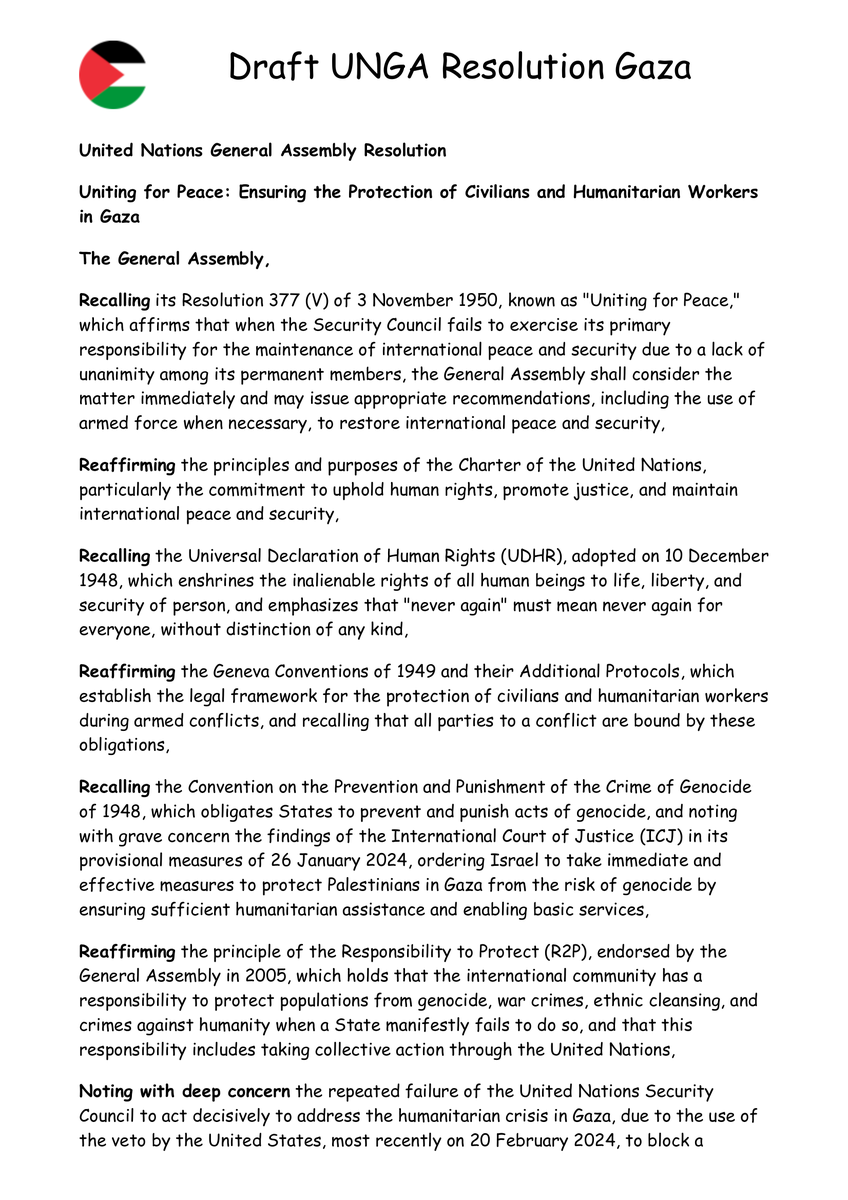
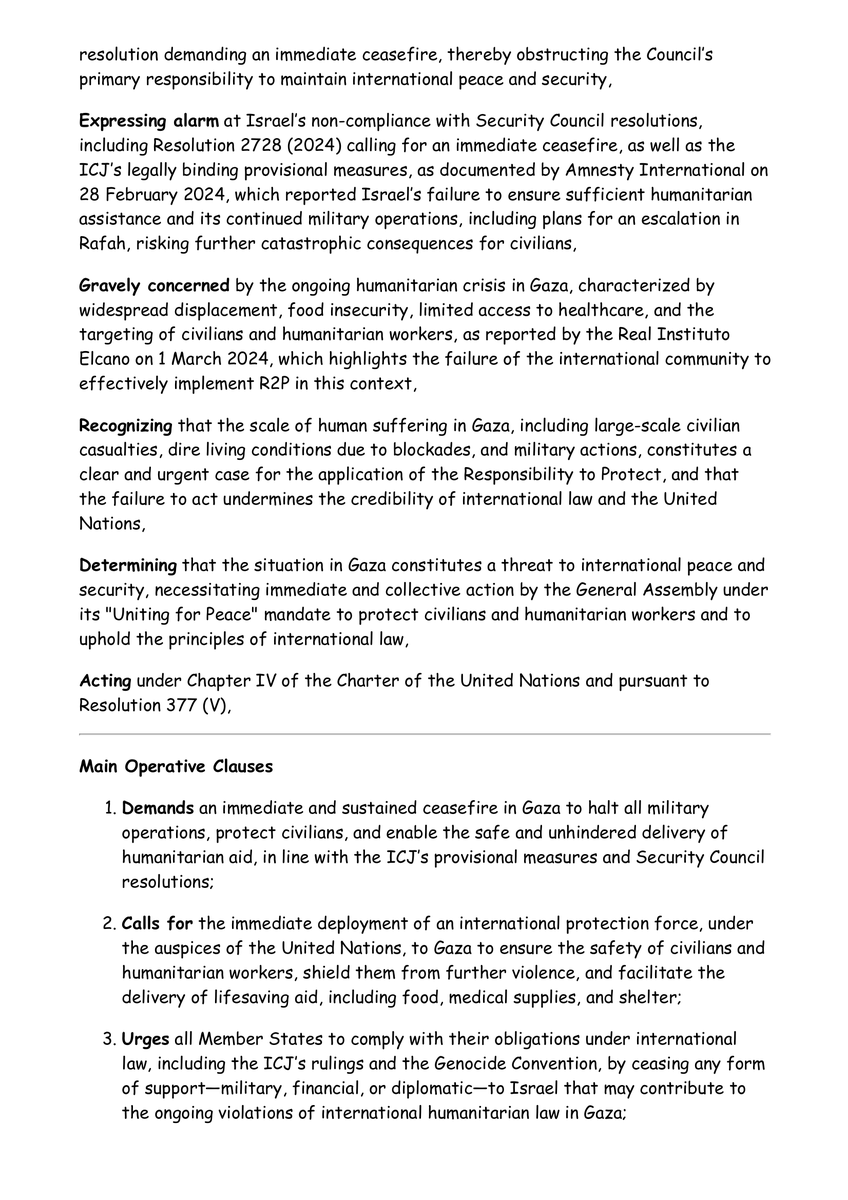
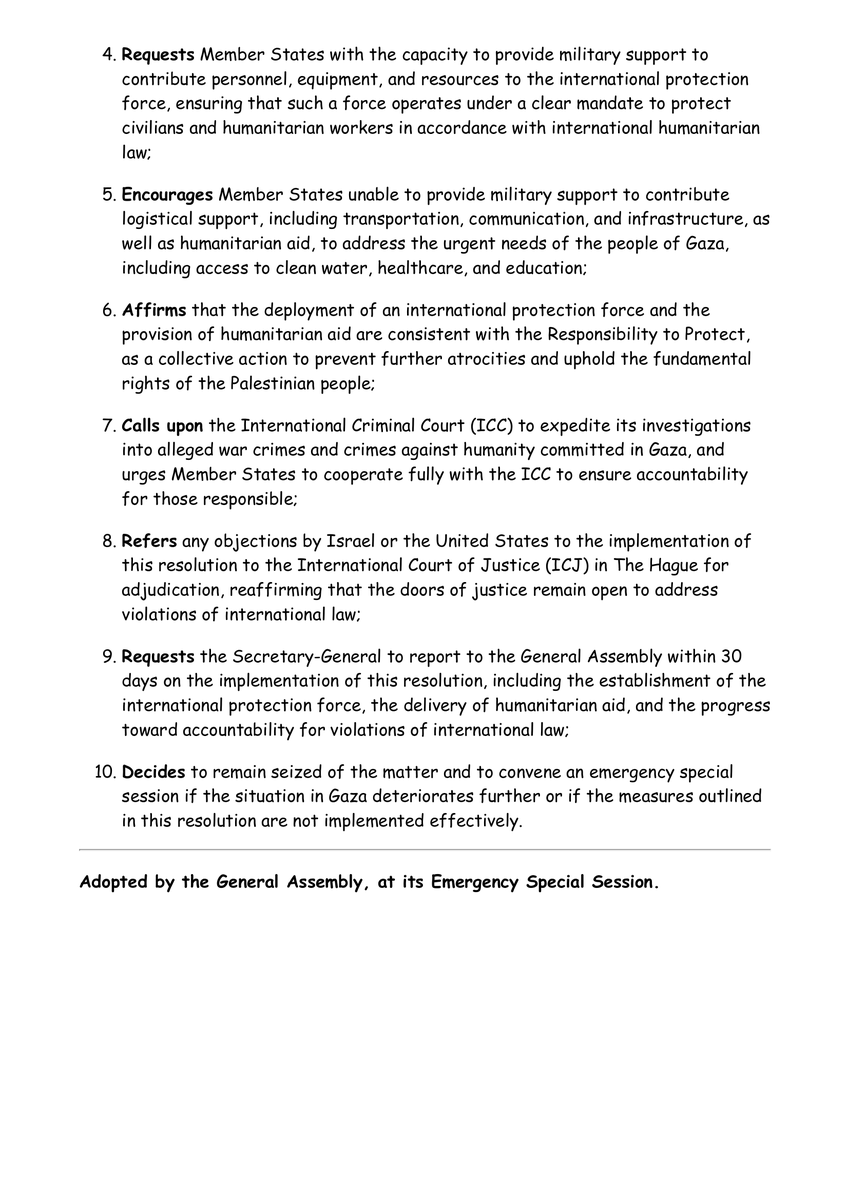
Resolution 377 is already in effect, enabling the UNGA to sidestep a deadlock (US-Veto) in UNSC. UNGA must floor a resolution for military protection of civilians and aid workers in Gaza. If Israel / US complain, refer them to the ICJ in The Hague, where the ICC awaits the war criminals.
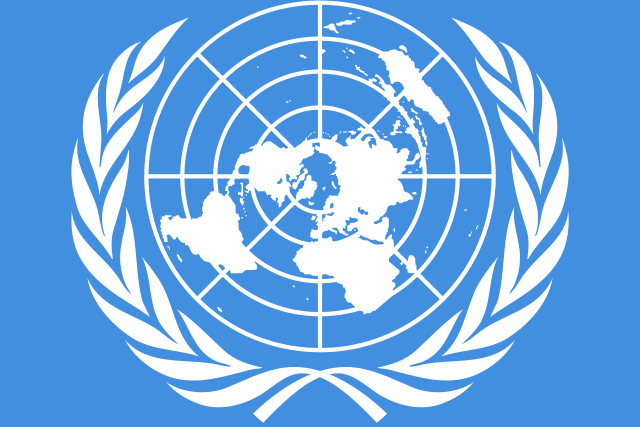
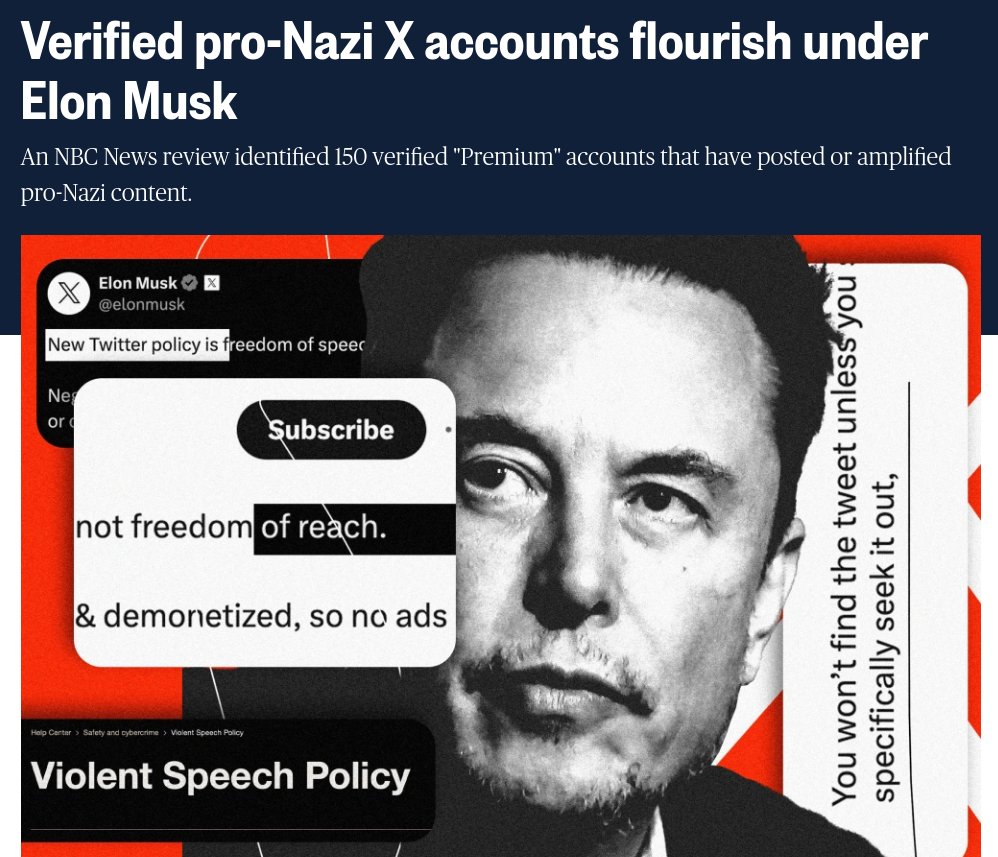
I've asked Grok to analyze my analytics data: 1.) Research suggests your X account may be experiencing shadow banning or algorithmic deboosting, given the low impressions relative to your follower count. 2.) It seems likely that reports from pro-Israeli accounts could contribute to reduced visibility, especially given your pro-Palestinian advocacy content. 3.) The evidence leans toward X handling such reports by reviewing and potentially limiting visibility, which aligns with your observed engagement drop.
This video, published by Hebrew media outlets, quoting the New York Times, shows a clip found on a mobile phone belonging to a paramedic whose body was found in a mass grave containing the bodies of 15 Palestinian Red Crescent paramedics and civil defense personnel killed by Israeli army fire in the Gaza Strip on March 23.
Resolution 377A(V), "Uniting for Peace," is already in effect, enabling the UN General Assembly (UNGA) to address threats to peace when the UN Security Council (UNSC) is deadlocked.
The Hague Group could propose an ES-10 resolution asserting that UNGA assumes UNSC powers in a U.S.-veto-induced deadlock, calling for voluntary military action against Israel.
If Israel or the U.S. complains about its legality, The Hague Group could refer them to the International Court of Justice (ICJ) in The Hague, where the International Criminal Court (ICC) awaits the war criminals.

Since 1948, Palestinians have endured a relentless campaign of violence and oppression that can be described as "death by a thousand pinpricks"—a slow, systematic erosion of their lives, land, and rights through cumulative acts of aggression. This pattern, rooted in the historical dynamics of colonial domination, aligns with the concept of "necrocolonialism," a term that encapsulates the deliberate infliction of death and suffering as a tool of control. The X post by Sarah Wilkinson on April 4, 2025, showing bodies blasted into the sky by a massive Israeli bomb in Gaza, serves as a stark illustration of this violence, but it is only one of many "pinpricks" in a decades-long process of destruction.
The 1948 Nakba marked the beginning of this campaign, with over 700,000 Palestinians expelled from their homes during the establishment of Israel. Village by village, families were displaced, often through massacres like Deir Yassin, where over 100 Palestinians were killed. This ethnic cleansing was not a singular event but a series of "pinpricks" that continued through the demolition of hundreds of villages in the following decades. Each expulsion, each destroyed home, contributed to the broader project of erasing Palestinian presence, a hallmark of necrocolonialism’s focus on death and domination.
Massacres have been a recurring feature of this violence, from Qibya in 1953 to Sabra and Shatila in 1982, and more recently, the 2014 Gaza War, which killed 2,205 Palestinians. The April 2025 bombing of a school-turned-shelter in Gaza City, killing 27, and the explosion depicted in Wilkinson’s X post are part of this pattern. Each massacre, while devastating in isolation, acts as a "pinprick" that accumulates to create a constant state of fear and loss, eroding Palestinian resilience over time.
Beyond physical violence, Israel’s policies of control have inflicted daily "pinpricks" through arbitrary detentions and prison abuses. Since the 1940s, administrative detention has been used to jail Palestinians without charge or trial, with over 2,200 detained since October 2023 alone. In detention, Palestinians face torture, sexual violence, and humiliation—acts designed to break individuals and, by extension, their communities. The confiscation of sanitary pads from women prisoners and threats of rape are not just physical violations but "pinpricks" that dehumanize and terrorize, aligning with necrocolonialism’s systematic infliction of suffering.
The blockade on Gaza since 2007 exemplifies this slow, grinding violence, restricting access to food, water, and medicine, and creating what Achille Mbembe calls "deathworlds." Combined with the destruction of infrastructure—hospitals, schools, and homes—these policies have led to over 100,000 injuries and the highest rate of child amputees per capita globally. Each restriction, each airstrike, is a "pinprick" that makes life increasingly untenable, serving the necrocolonial goal of control through death and displacement.
The Necromongers from The Chronicles of Riddick, who view life as an error to be purged, offer a chilling metaphor for the dehumanization that enables this violence. While their cosmic ideology differs from the political motivations in Palestine, their disregard for life mirrors the systemic erasure of Palestinian humanity. Necrocolonialism, as a framework, captures this dual reality: the "necro" element reflects the focus on death through massacres, detentions, and torture, while the "colonialism" aspect ties these acts to a historical struggle over land and power, rooted in the Nakba and perpetuated through occupation.
"Death by a thousand pinpricks" thus fits the Palestinian experience, describing a campaign where each act of violence—whether a massacre, a detention, or a restriction—accumulates to create a deathworld. The X post’s image of bodies in the sky is a visceral reminder of the larger "pinpricks," but the quieter, daily abuses are just as deadly in their cumulative effect. Together, these concepts demand a reckoning with the systematic savagery of necrocolonialism, urging the world to name and confront this violence in all its forms.
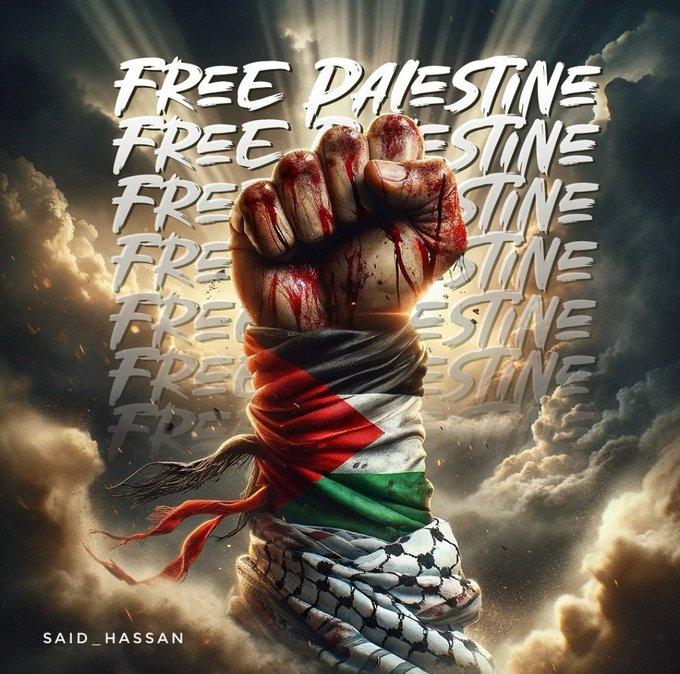
Since 1948, Palestinians have endured a relentless campaign of violence and oppression that can be described as "death by a thousand pinpricks"—a slow, systematic erosion of their lives, land, and rights through cumulative acts of aggression. This pattern, rooted in the historical dynamics of colonial domination, aligns with the concept of "necrocolonialism," a term that encapsulates the deliberate infliction of death and suffering as a tool of control. The X post by Sarah Wilkinson on April 4, 2025, showing bodies blasted into the sky by a massive Israeli bomb in Gaza, serves as a stark illustration of this violence, but it is only one of many "pinpricks" in a decades-long process of destruction.
The 1948 Nakba marked the beginning of this campaign, with over 700,000 Palestinians expelled from their homes during the establishment of Israel. Village by village, families were displaced, often through massacres like Deir Yassin, where over 100 Palestinians were killed. This ethnic cleansing was not a singular event but a series of "pinpricks" that continued through the demolition of hundreds of villages in the following decades. Each expulsion, each destroyed home, contributed to the broader project of erasing Palestinian presence, a hallmark of necrocolonialism’s focus on death and domination.
Massacres have been a recurring feature of this violence, from Qibya in 1953 to Sabra and Shatila in 1982, and more recently, the 2014 Gaza War, which killed 2,205 Palestinians. The April 2025 bombing of a school-turned-shelter in Gaza City, killing 27, and the explosion depicted in Wilkinson’s X post are part of this pattern. Each massacre, while devastating in isolation, acts as a "pinprick" that accumulates to create a constant state of fear and loss, eroding Palestinian resilience over time.
Beyond physical violence, Israel’s policies of control have inflicted daily "pinpricks" through arbitrary detentions and prison abuses. Since the 1940s, administrative detention has been used to jail Palestinians without charge or trial, with over 2,200 detained since October 2023 alone. In detention, Palestinians face torture, sexual violence, and humiliation—acts designed to break individuals and, by extension, their communities. The confiscation of sanitary pads from women prisoners and threats of rape are not just physical violations but "pinpricks" that dehumanize and terrorize, aligning with necrocolonialism’s systematic infliction of suffering.
The blockade on Gaza since 2007 exemplifies this slow, grinding violence, restricting access to food, water, and medicine, and creating what Achille Mbembe calls "deathworlds." Combined with the destruction of infrastructure—hospitals, schools, and homes—these policies have led to over 100,000 injuries and the highest rate of child amputees per capita globally. Each restriction, each airstrike, is a "pinprick" that makes life increasingly untenable, serving the necrocolonial goal of control through death and displacement.
The Necromongers from The Chronicles of Riddick, who view life as an error to be purged, offer a chilling metaphor for the dehumanization that enables this violence. While their cosmic ideology differs from the political motivations in Palestine, their disregard for life mirrors the systemic erasure of Palestinian humanity. Necrocolonialism, as a framework, captures this dual reality: the "necro" element reflects the focus on death through massacres, detentions, and torture, while the "colonialism" aspect ties these acts to a historical struggle over land and power, rooted in the Nakba and perpetuated through occupation.
"Death by a thousand pinpricks" thus fits the Palestinian experience, describing a campaign where each act of violence—whether a massacre, a detention, or a restriction—accumulates to create a deathworld. The X post’s image of bodies in the sky is a visceral reminder of the larger "pinpricks," but the quieter, daily abuses are just as deadly in their cumulative effect. Together, these concepts demand a reckoning with the systematic savagery of necrocolonialism, urging the world to name and confront this violence in all its forms.
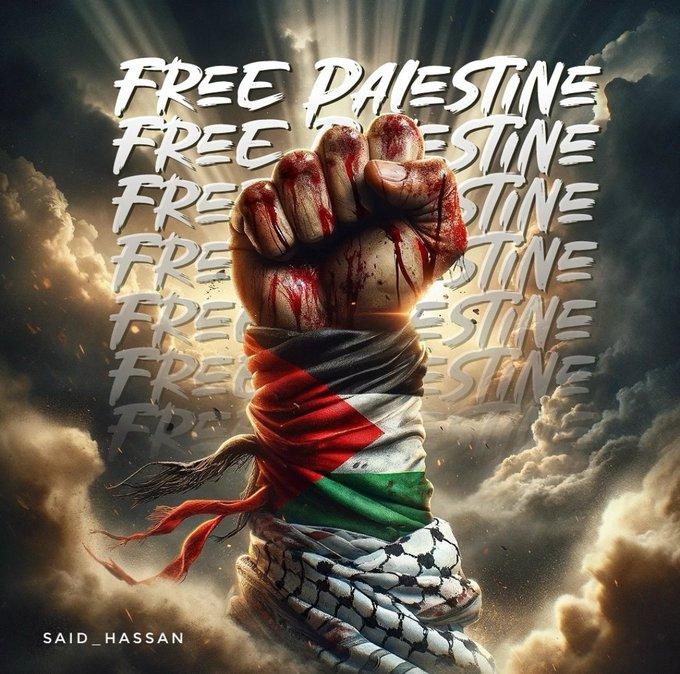
Today I've seen human bodies blasted into the sky like dolls. Genocide falls short of describing this level of savagery. I've asked Grok to come up with a better word. What do you think?
Over the past 24 hours, Israeli occupation forces committed three massacres in northern Gaza. Hossam would have moved from one massacre to the next, documenting every moment. Today, his voice is gone from the scene—but don't let his journey end. Keep talking about Gaza. https://x.com/HossamShabat/status/1908217214936719804
19 martyrs were killed as a result of the occupation forces' bombing of the Al-Aqqad family home in the Al-Manara neighborhood in Khan Yunis. https://x.com/HossamShabat/status/1908057102880215423
(6) The day after Ahmed's death, another lawyer visited another minor detainee in Megiddo Prison. In a conversation with Haaretz, she said that the detainee reported an illness spreading among the prisoners, with symptoms including stomach aches, headaches, diarrhea, and loss of consciousness. According to the detainee, he witnessed Ahmed's collapse. "He said that Ahmed, who was sick with the same illness, left the room and went into the yard and suddenly fell and hit his head. The minors tried to give him first aid and called the guards, who refused to help. When they realized he was dead, they took him in their arms and placed him near the door of the wing, and then the guards took him out of there," said the lawyer, who asked to remain anonymous for fear of harassment. According to her, the detainee she visited expressed concern for his own health after he also contracted the same illness and scabies that are rampant in prisons. 7/. Photo: Walid Khaled Abdullah Ahmed, the late
This heavy night never ends! Strengths have failed, souls are exhausted, and the road is still paved with blood and body parts. Silence in the presence of death is more eloquent than all words! O God, provide for us, for we do not know how to manage well. Our Lord is with us.
Just 19 views in 2 hours indicate that Elon "Nazi Salute" Musk is heavily deboosting this. https://x.com/R34lB0rg/status/1907334274094596413
As for Khan Yunis, the funeral procession was held for the Red Crescent martyrs, the paramedics who were assassinated in cold blood by the criminal forces while performing their humanitarian duty. https://x.com/KhaledSafi/status/1906625976982729056
Inquiries sent to ICJ & DIRCO about South Africa’s Memorial (10/28/24) in South Africa v. Israel genocide case. Will update on its availability. #PublicServiceNotice #ICJ #SouthAfrica #Gaza
Waleed Ahmad’s death in Israeli custody highlights the systemic issues of administrative detention, which violates Palestinian rights to liberty, due process, self-determination, and freedom from torture. Israel’s practices, legal under its own laws, mirror Nazi Germany’s use of legal detention to oppress, with similar laws denying judicial redress.
Comparison: - Nazi Detention: Legally sanctioned by Nazi laws (Reichstag Fire Decree, Nuremberg Laws) that stripped Jews of rights, including judicial redress, leading to genocide with the intent to exterminate. - Israeli Detention: Legally sanctioned by Israeli laws (Emergency Powers Law, Military Order 1651) that strip Palestinians of rights, including judicial redress, through secret evidence and unfair military courts. While administrative detention aims to control, broader actions in Gaza, including a parliamentary letter advocating for the destruction of life-sustaining resources and killing of civilians, suggest genocidal intent.
Similar Laws: Both Nazi Germany and Israel enacted laws that suspend fundamental rights, deny judicial redress, and target specific groups, enabling state-sanctioned oppression. Evidence from Amnesty International, Holocaust scholars, and the parliamentary letter indicates that Israel’s actions in Gaza may be intentionally genocidal, as they align with the UN Convention’s definition of genocide through killing and inflicting conditions of life aimed at physical destruction.
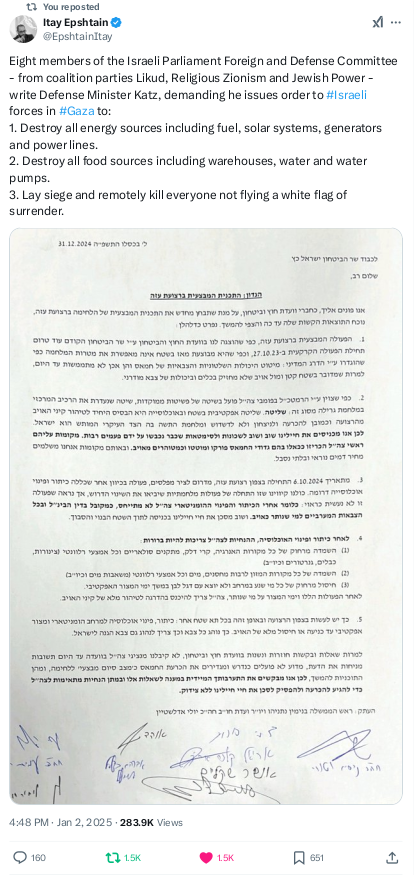
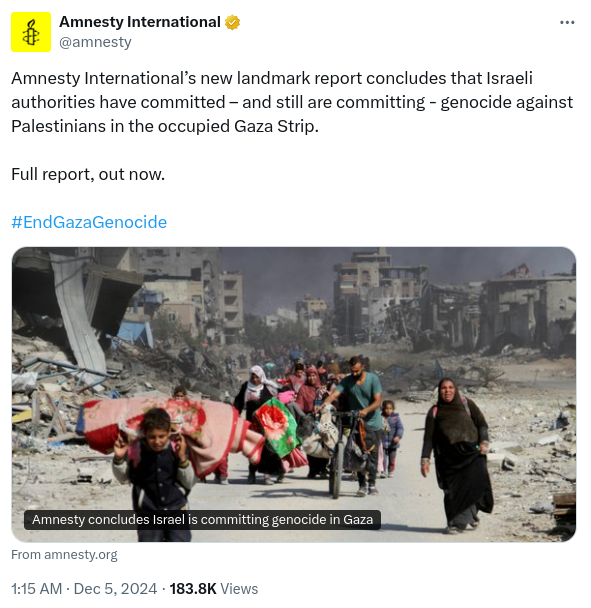
Waleed Ahmad’s death in Israeli custody highlights the systemic issues of administrative detention, which violates Palestinian rights to liberty, due process, self-determination, and freedom from torture. Israel’s practices, legal under its own laws, mirror Nazi Germany’s use of legal detention to oppress, with similar laws denying judicial redress.
Comparison: - Nazi Detention: Legally sanctioned by Nazi laws (Reichstag Fire Decree, Nuremberg Laws) that stripped Jews of rights, including judicial redress, leading to genocide with the intent to exterminate. - Israeli Detention: Legally sanctioned by Israeli laws (Emergency Powers Law, Military Order 1651) that strip Palestinians of rights, including judicial redress, through secret evidence and unfair military courts. While administrative detention aims to control, broader actions in Gaza, including a parliamentary letter advocating for the destruction of life-sustaining resources and killing of civilians, suggest genocidal intent.
Similar Laws: Both Nazi Germany and Israel enacted laws that suspend fundamental rights, deny judicial redress, and target specific groups, enabling state-sanctioned oppression. Evidence from Amnesty International, Holocaust scholars, and the parliamentary letter indicates that Israel’s actions in Gaza may be intentionally genocidal, as they align with the UN Convention’s definition of genocide through killing and inflicting conditions of life aimed at physical destruction.
Child tortured to death after being held hostage for six months. https://x.com/AP/status/1907073106453131433
Fuck Israel. Fuck Elon Musk. Fuck X.
And for our friends "down under": Just substitute North for South. https://x.com/R34lB0rg/status/1907147650417217631
Lost your GPS? Let the sky be your guide:
Sun rises in the east, approaches south mid-day and sets in the west.
Full Moon mirrors the arc of the sun, a waxing crescent (in the evening) points west, a waning crescent (in the morning) points east.
Since the beginning of Ramadan, the Israeli occupation has imposed a suffocating blockade on Gaza, forcing 18 bakeries to completely shut down due to a shortage of flour and the lack of essential bread-making ingredients. With skyrocketing prices and a shortage of cooking gas, Gazans are struggling to make ends meet. If this forced starvation continues, thousands of lives will be at risk of starvation. Is there anyone to respond?
Urgent | Dear colleague and journalist Mohammed Saleh al-Bardawil, his wife and children were martyred as a result of an Israeli airstrike on his apartment in Khan Yunis, south of the Gaza Strip. https://x.com/AnasAlSharif0/status/1906859417045172620
A tribute to @HossamShabat (عَلَيْهِ ٱلسَّلَامُ): You can silence the messenger but the truth will continue to echo.
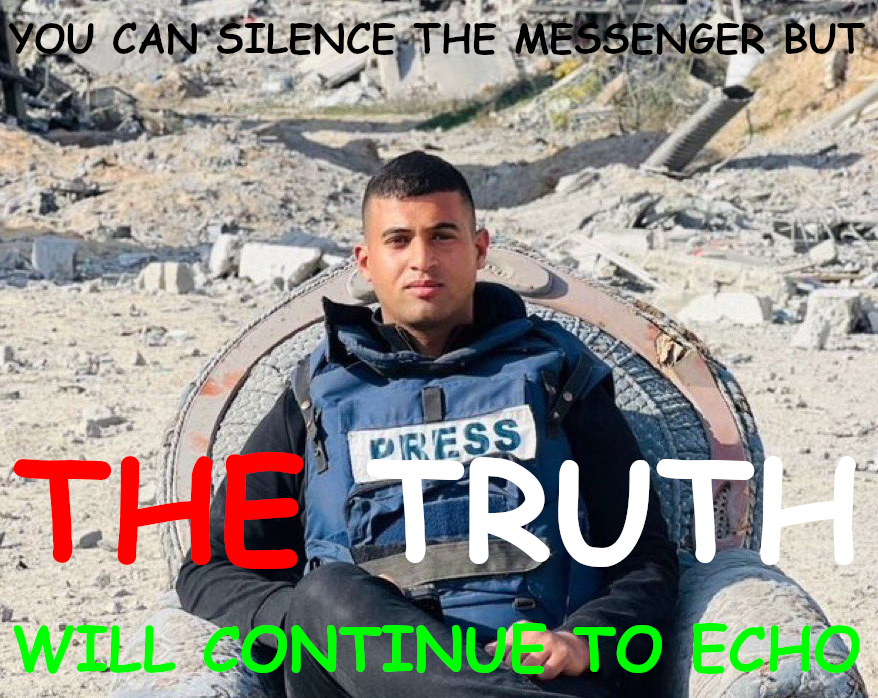
If you conflate Zionism with Judaism, you're supporting Israel and their actions in Gaza. #Hasbara hinges on framing critique as antisemitism to shield policy. Target the state, not the faith. https://x.com/R34lB0rg/status/1906952107543970101
FYI @EFF @ACLU @CenDemTech @amnesty @citizenlab @accessnow @privacyint @RSF_inter https://x.com/R34lB0rg/status/1906941232384749755
The Clipper chip was a bold misstep by the U.S. government’s three-letter agencies—NSA, FBI, CIA—in the 1990s. Designed as an encryption chipset for telephones, it promised security with a catch: a backdoor via key escrow, letting law enforcement decrypt calls with the right paperwork. Launched in 1993, it crashed and burned by 1996—privacy advocates revolted, a flaw exposed by Matt Blaze shredded its credibility, and the market rejected it. AT&T’s TSD-3600, the only Clipper-equipped phone, sold a paltry 9,000 units before fading away. The takeaway for the agencies? Forcing backdoors down the public’s throat doesn’t work when the agenda’s out in the open.
Today, they’ve pivoted to a subtler play: government purchasing power. No need for mandates when billions in contracts—military, federal, agency tech—can nudge manufacturers into compliance. Android’s ecosystem fits this bill perfectly. OEMs like Samsung, Xiaomi, and even Google don’t need a law to embed “special access” features if a lucrative deal hints at it. Locked bootloaders, proprietary firmware, and telemetry aren’t just for user safety—they’re control points, shaped by market incentives rather than public edicts. Clipper’s failure taught them stealth trumps swagger; now they wield influence through dollars, not decrees.
Why should manufacturers care what you do with their devices? They shouldn’t. Their job is to sell phones, not dictate your usage. Yet Android’s ecosystem is a fortress of restrictions—rooting is a war against Knox, SafetyNet, or carrier locks. If they’ve got no ulterior motive, why fight your freedom? The answer lies in who they’re really serving. Banks and government apps tout Android as secure—Play Protect, sandboxing—while pre-installed bloatware phones home and OEMs get caught with backdoors (think OnePlus logging clipboard data or HTC’s Carrier IQ mess). It’s security theater, not sovereignty. Control benefits someone—advertisers, governments, or both—not the owner holding the device.
Israel’s exploitation of Android shows how this plays out. Reports from 2024, like The Intercept’s dive into WhatsApp vulnerabilities, reveal how metadata—who’s talking, when, where—pinpoints targets in Gaza. The “Lavender” system, per +972 Magazine, rates Palestinians for strikes based on digital trails, including WhatsApp usage. NSO Group’s Pegasus spyware, sold globally, takes it further—zero-click exploits via WhatsApp messages turn Android phones into tracking beacons or live mics. Amnesty International’s 2019 Moroccan activist findings and Citizen Lab’s 2021 journalist report highlight its reach. No Clipper-style backdoor needed—just an ecosystem ripe for abuse.
Silent SMS adds another layer. These invisible “Type 0” messages ping your Android without a peep—Germany’s police sent tens of thousands yearly (Der Spiegel, 2010), and Israel’s linked to similar tricks via NSO tools. Built into the GSM standard, they’re sold as network tools—testing signals, aiding 911 calls. But in 2025, with LTE/5G, why’s this silent backchannel still there? The legit use case is thin; the surveillance payoff is fat. A phone that answers unseen pings is a locator for anyone with carrier access or the right exploit. It’s not for you—it’s for them.
From Clipper to Android, the shift is clear. Agencies learned overt backdoors flop—now they lean on purchasing clout to shape ecosystems like Android’s. Manufacturers shouldn’t care what you do, but they do—because their loyalty isn’t to you. Israel’s tracking, WhatsApp’s holes, and silent SMS prove the tools are embedded, ready for use. Android’s not your device; it’s theirs.
Was ist der Unterschied zwischen der EU und dem Eiffelturm?
Beim Eiffelturm sitzen die größten Nieten unten!
Happy New Year, but is Gaza okay?! Eid has come, and loss fills the hearts and pain is everywhere... Praise be to God in all circumstances, I ask God to mend the broken hearts. Eid came while I was away from my family, amidst constant threats from the occupation forces that have been pursuing us since the beginning of the aggression on Gaza. Eid has come, but it's not like any other holiday... A few days ago, our beloved martyrs, colleagues Hossam Shabat and Mohammed Mansour, were targeted, and before them were many colleagues who were guilty of nothing other than conveying the truth, presenting the picture, and documenting the painful scene.
To Hossam... from your team that loved you
While many knew him as a brave journalist, Hossam was much more. He was a young man full of dreams, with a sense of humor, and a vibrant heart. He liked to dress carefully even in the midst of chaos, and once joked:
“What if I meet a pretty girl while covering? I want to look stylish!”
He had crushes here and there, and he dreamed of love, of building a family, of being a husband and a father. He talked about the future as if it were something real, something achievable. He didn't just want headlines and front lines, he wanted quiet mornings, simple dinners, and laughter with the people he loved.
He dreamed of leaving Gaza one day, and said: “When all this is over, I'm going to take a long break… I want to visit a beautiful country.”
He longed for peace, not only for his people, but for his soul as well. He wanted a chance to breathe freely, to explore, to just be.
He grew up by the sea and loved seafood passionately, he would smile and say: “I love all things seafood…I grew up on it.”
There was something about the water that calmed him, something that reminded him of home, even when everything around him was crumbling.
At night, he would put on his headphones and listen to music, especially Palestinian songs. He would spend time during the day downloading them, finding in the melodies a small escape when the city fell silent. It was his small peace amidst the rubble, a rhythm in the heart of the destruction.
It was pure, it was clean. Inside him was a tenderness that never hardened, even in war. There was a gentleness in him that was untouched by the noise of the world around him. He believed in beauty, in love, in something more beautiful.
And so he should be remembered, not just as a journalist, but as a young man who wanted to live.
The humanitarian crisis in Gaza has reached catastrophic levels, with Israel imposing a complete blockade that has prevented all aid, including food, water, and medicine, from entering for over three weeks as of March 28, 2025. This deliberate and state-sponsored deprivation has caused mass suffering, with the UNRWA reporting hunger, lack of medicine, soaring prices, and increased disease risk. The blockade, combined with relentless violence—over 500 civilian deaths in a single day last week, the deadliest in 1.5 years—has decimated Gaza’s population, potentially reducing it from 2.2 million to 1.7 million, as suggested by former President Trump’s statement. This 500,000-person decline, far exceeding the official death toll of 48,297, indicates a massive loss of life due to starvation, dehydration, disease, and violence, exacerbated by Gaza’s chronic malnutrition from repeated sieges, leaving the population with no reserves to withstand further deprivation.
Israel’s actions violate numerous international laws, including the prohibition on starvation as a method of warfare (Article 54 of Additional Protocol I), the targeting of civilians and humanitarian workers (173 UNRWA staff killed, a WCK staff member killed on March 27, 2025), and the infliction of conditions leading to extermination, a crime against humanity under Article 7 of the Rome Statute. The ICC arrest warrants for Netanyahu and Gallant confirm these violations, yet Israel continues with impunity, enabled by the US veto in the UNSC, which has blocked resolutions for humanitarian pauses and ceasefires, shielding Israel from consequences. This systemic failure has led to widespread condemnation, with both Israel and the US increasingly viewed as pariah states for their roles in perpetuating the crisis.
The blockade’s impact is tantamount to extermination, as it deliberately deprives a malnourished population of sustenance, leading to mass death. Gazans, already weakened by years of sieges, cannot survive prolonged starvation—many likely succumb within weeks, not months, due to depleted reserves and lack of water. The international community’s failure to act, despite the crisis unfolding in broad daylight, violates the Responsibility to Protect (R2P) doctrine, which mandates intervention to prevent war crimes and crimes against humanity. The US veto has paralyzed the UNSC, but UNGA Resolution 377 ("Uniting for Peace") offers a pathway to bypass this obstruction, allowing the General Assembly to authorize collective action, including the use of force, when the UNSC fails to maintain international peace and security.
Advocating for Resolution 377 is critical to address this crisis. The UNGA must immediately convene an emergency session to invoke Resolution 377 and authorize a military-escorted aid convoy to break the blockade and deliver life-saving food, water, and medicine to Gaza’s 1.7 million remaining residents. This operation requires a coalition of willing states—potentially Turkey, Egypt, or Qatar—to provide troops, with a mandate to use defensive force to ensure aid delivery, adhering to IHL principles of proportionality and distinction. The convoy could enter via the Rafah or Erez crossings, though Israeli resistance is likely, given the ICC warrants and Israel’s defiant stance.
The urgency cannot be overstated: every day without aid results in more deaths, with the population’s extreme vulnerability accelerating the toll. While risks of escalation exist, potentially involving the US, Russia, and China, the scale of the crisis—potentially 500,000 deaths—demands action. The international community must also strengthen legal accountability through the ICC and ICJ, mobilize global solidarity via advocacy and boycotts, and support UNRWA to ensure readiness for aid distribution once access is restored. Invoking Resolution 377 and delivering aid with a military escort is the most immediate way to halt this extermination, uphold R2P, and save lives in Gaza, challenging the impunity enabled by the US veto and addressing the moral failure of the global order.
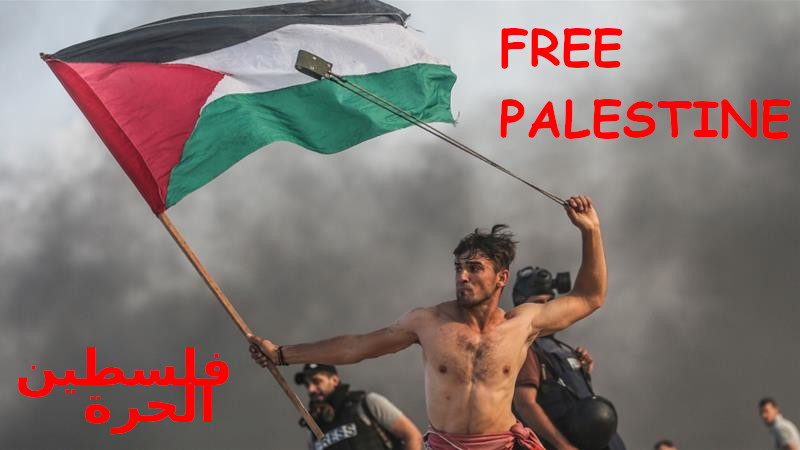
Trump's MAGA crowd ought to consider one thing: He won't stay in power forever and the next government might use the very same laws against them.
You're a Israeli dual citizen? Government claims you're not a US-citizen and you're out. https://x.com/R34lB0rg/status/1905198993727955294
Trump’s plan for mass deportations without hearings hinges on claiming “non-citizen” status. No right to due process means no right to prove your status. If the government claims you're not a citizen, you're done.
I would love that! ❤️🇵🇸 https://x.com/mohammed31668/status/1905194112430506480